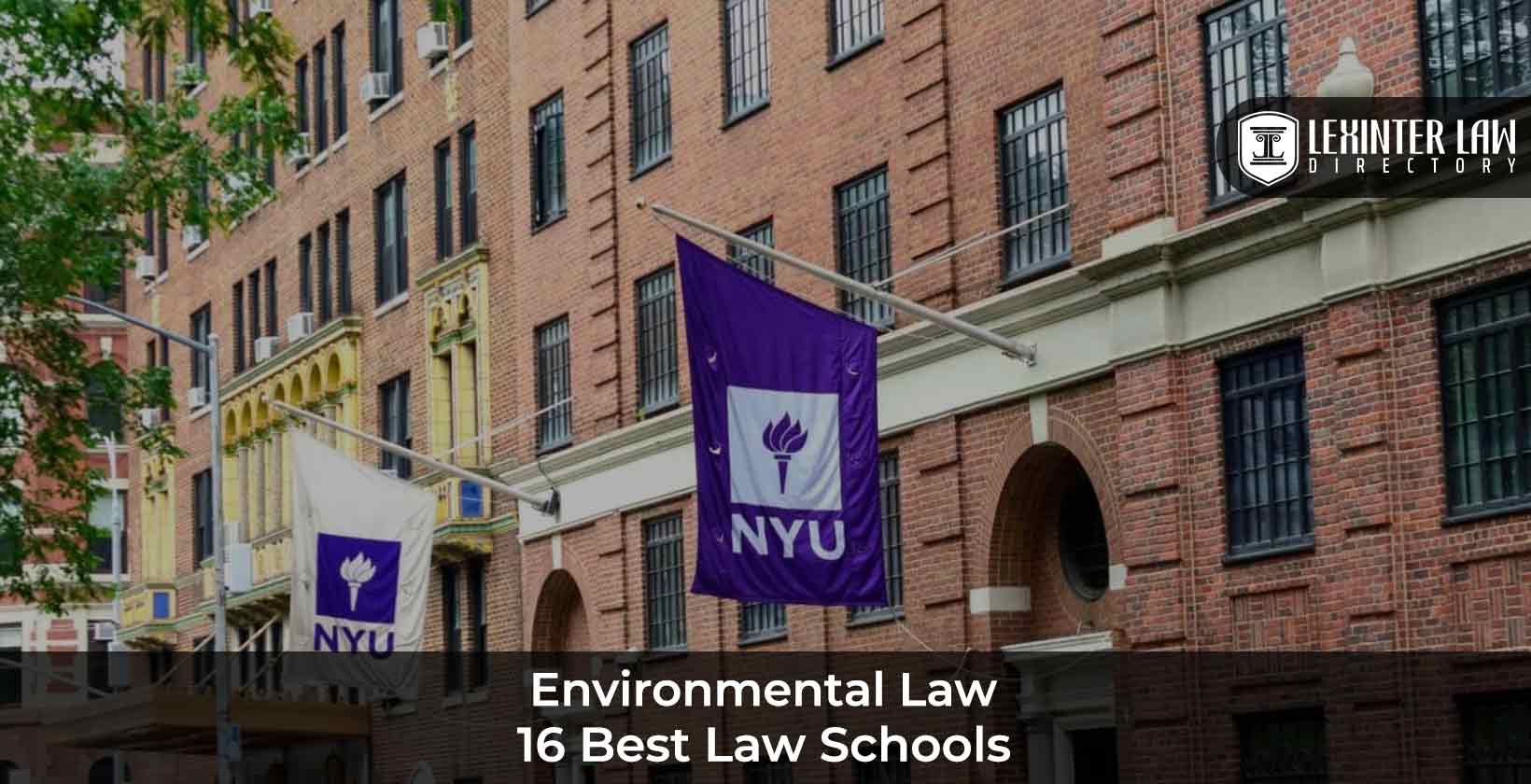16 Best Environmental Law Schools
The 16 best environmental law schools stand out for their comprehensive programs and commitment to addressing the pressing environmental issues of today. New York University and Pace University (Haub) have earned a reputation for their innovative approaches to environmental law. The environmental law degree offered by Harvard University and Yale University reflects their esteemed academic standing. The law schools provide students with unparalleled resources and opportunities for research and practical experience. Columbia University and the University of California (Berkeley) are among the best environmental law schools. The law schools have strong environmental law programs that emphasize interdisciplinary study, allowing students to engage with environmental science, policy, and law. Each institution offers unique strengths and specializations, from policy-making and international environmental law to sustainable business practices. Students in the programs benefit from a curriculum that balances theoretical knowledge with real-world application. The best environmental law schools provide students with the skills and knowledge necessary to become leaders in the field.
The 16 best law schools for environmental law are listed below.
- New York University Law School: New York University School of Law excels in environmental law, offering comprehensive programs with JD, LLM, and JSD degrees. The school ranks 9th overall and 10th in environmental law. The annual cost is $118,137, with a 16.76% acceptance rate. The Environmental Law Clinic and Frank J. Guarini Center provide hands-on experience. Graduates have a 97.67% employment rate.
- Elisabeth Haub School of Law at Pace University: Pace University’s Elisabeth Haub School of Law ranks first in environmental law. The law school offers JD, LLM, and SJD programs, with an acceptance rate of 53.34%. Tuition is $54,890 for full-time JD students. The Environmental Litigation Clinic provides hands-on experience for aspiring lawyers. Notable faculty and alumni in environmental law include Jason J. Czarnezki and Hiroko Muraki Gottlieb.
- Harvard Law School: Harvard Law School ranks fourth overall and tenth in environmental law. The law school offers JD, LL.M., and S.J.D. programs, with an acceptance rate of 9.58%. Tuition is $78,692 annually. The Emmett Environmental Law and Policy Clinic provides hands-on experience. Notable faculty in environmental law include Jody Freeman and Richard Lazarus. Graduates have a 90.2% employment rate in full-time legal jobs.
- Columbia Law School: Columbia Law School ranks eighth overall and fourth in environmental law. The law school offers JD, LL.M., and J.S.D. programs, with a 12.23% acceptance rate. Tuition is $81,292 annually. The Sabin Center for Climate Change Law provides hands-on experience. Notable faculty in environmental law include Michael Gerrard and Michael Burger. Graduates have a 95.1% employment rate in long-term, full-time legal positions.
- Yale Law School: Yale Law School, established in 1824, ranks first overall and highly in environmental law. The law school offers JD, LL.M., J.S.D., and joint degrees, with a 5.72% acceptance rate. Tuition is $76,369 annually. The Environmental Protection Clinic and Yale Center for Environmental Law and Policy provide hands-on experience. Notable faculty in environmental law include Daniel C. Esty and Gerald Torres. Graduates have a 96.9% employment rate.
- UC Berkeley School Of Law: The University of California, Berkeley School of Law ranks 12th overall and second in environmental law. The law school offers JD, LL.M., and J.S.D. programs, with tuition at $63,196 for residents. The Center for Law, Energy & the Environment provides hands-on experience. Notable faculty in environmental law include Holly Doremus and Daniel Farber. Graduates have a 96.38% employment rate.
- Georgetown University Law Center: Georgetown University Law Center ranks 14th overall and 10th in environmental law. The law school offers JD, LL.M., and joint degrees, with a 12.9% acceptance rate. The Environmental Law and Policy Program provides hands-on experience. Notable faculty include Lisa Heinzerling and William W. Buzbee. Graduates have an 89.3% employment rate in long-term, full-time legal roles.
- University Of Michigan Law School: The University of Michigan Law School ranks ninth overall and 17th in environmental law. The law school offers JD and LL.M. programs, with a 12.58% acceptance rate. The Environmental Law and Policy Program provides hands-on experience. Notable faculty in environmental law include Nina Mendelson and Jennifer Haverkamp. Graduates have a 98% employment rate.
- Cornell Law School: Cornell Law School ranks 14th overall and 50th in environmental law. The law school offers JD, LL.M., J.S.D., and dual degrees, with an 18.39% acceptance rate. Tuition is $77,593 annually. The Water Law Clinic and Environmental Law Society provide practical experience. Notable faculty in environmental law include Jeffrey J. Rachlinski and Sara Bronin. Graduates have a 96.6% employment rate in long-term jobs.
- UCLA School of Law: UCLA School of Law ranks 13th overall and 5th in environmental law. The law school offers JD, LL.M., M.L.S., and S.J.D. programs, with a 16.8% acceptance rate. The Emmett Institute and Environmental Law Clinic provide practical experience for aspiring environmental lawyers. Notable faculty in environmental law include Edward A. Parson and Ann Carlson. Graduates have a 96.7% employment rate in full-time, long-term positions.
- Lewis & Clark Law School: Lewis & Clark Law School ranks 82nd overall and 3rd in environmental law. The law school offers JD, LL.M., and M.S.L. programs, with a 67.88% acceptance rate. The Earthrise Law Center and International Environmental Law Project provide hands-on experience. Notable faculty in environmental law include Melissa Powers and Chris Wold. Graduates have a 90% employment rate within ten months.
- American University Washington College of Law: American University Washington College of Law ranks 98th overall and 7th in environmental law. The law school offers JD, LL.M., and MLS programs, with a 35.7% acceptance rate. The Program on Environmental and Energy Law provides hands-on experience. Notable faculty in environmental law include David Hunter and Marcos Orellana. Graduates have a 79.2% employment rate in long-term, full-time legal positions.
- Vermont Law School: Vermont Law School ranks 168th overall and 4th in environmental law. The law school offers JD, LL.M., and master’s programs, with a 64.19% acceptance rate. Tuition is $53,768 annually. The Environmental Advocacy and Environmental Justice Clinics provide hands-on experience. Notable faculty in environmental law include David B. Firestone and Jennifer K. Rushlow. Graduates have an 81.82% employment rate, excelling in environmental law.
- George Washington University Law School: George Washington University Law School ranks 41st overall and 17th in environmental law. The law school offers JD, LL.M., and dual degrees, with a 28.72% acceptance rate. The environmental law program provides hands-on experience through clinics and externships. Notable faculty in environmental law include Robert L. Glicksman and Randall S. Abate. Graduates have an 89.8% employment rate in long-term, full-time legal jobs.
- University of Oregon School of Law: The University of Oregon School of Law ranks 82nd overall and 7th in environmental law. The law school offers JD and LL.M. programs, with a 75.23% acceptance rate. Tuition is $48,516 for residents. The Environmental and Natural Resources Law Center provides hands-on experience. Notable faculty in environmental law include Mary Wood and John Bonine. Graduates have an 89% employment rate, excelling in environmental law.
- Vanderbilt Law School: Vanderbilt University Law School ranks 19th overall and 10th in environmental law. The law school offers JD, LL.M., and Ph.D. in Law and Economics programs, with a 16.76% acceptance rate. Tuition is $73,148 annually. The Energy, Environment, and Land Use Program provides hands-on experience. Notable faculty in environmental law include J.B. Ruhl and Michael Vandenbergh. Graduates have a 96% employment rate within ten months.
Table of Contents
- 1. New York University Law School
- 2. Elisabeth Haub School Of Law At Pace University
- 3. Harvard Law School
- 4. Yale Law School
- 5. Columbia Law School
- 6. UC Berkeley School Of Law
- 7. Georgetown University Law Center
- 8. University Of Michigan Law School
- 9. Cornell Law School
- 10. UCLA School Of Law
- 11. Lewis & Clark Law School
- 12. American University Washington College Of Law
- 13. Vermont Law School
- 14. George Washington University Law School
- 15. University Of Oregon School Of Law
- 16. Vanderbilt Law School
- How To Choose The Best Environmental Law School?
- What Is The Best Major For Environmental Law?
- How To Become An Environmental Lawyer?
- How Long Would It Take To Study Environmental Law?
- What Can You Expect From A Career As An Environmental Lawyer?
- What Is The Difference Between An Environmental Lawyer And A Health Care Lawyer?
- How Do Environmental Lawyers Earn?
- Where Do Environmental Lawyers Work?
- How To Find Good Environmental Lawyers Near Me With Lexinter?
- Which Country Has The Best Environmental Law?
1. New York University Law School

New York University School of Law stands out as one of the best law schools for environmental law. The school offers comprehensive programs that prepare students for impactful careers. NYU Law was established in 1835 and is located in New York City. The dynamic urban setting provides students with unique opportunities for professional growth and practical experience. The school’s renowned expertise in environmental law makes the institution a top choice for aspiring legal professionals. New York University School of Law offers diverse law degree programs, including JD, LLM, JSD, and joint degrees. Students gain hands-on experience through clinics, externships, and simulation courses. Renowned faculty members, over 100 in number, support the vibrant intellectual community in New York City. New York University School of Law has a 16.76% acceptance rate for 2023-2024, with a median LSAT score of 172 and a GPA of 3.90. The law school tuition is $80,014 per year, with additional fees totaling an estimated annual cost of $118,137.
New York University School of Law ranks 9th in the 2024 U.S. News & World Report law school rankings. The school excels in several specialties, holding the 1st rank in tax law, 1st in international law, and 1st in criminal law. Environmental law ranks 10th, reflecting strong performance in a critical area. NYU Law enjoys a stellar reputation for producing top-tier legal professionals and scholars. The school consistently attracts high-caliber students from around the globe. New York University School of Law offers specialized programs in environmental law, including the Frank J. Guarini Center on Environmental, Energy, and Land Use Law. The center focuses on innovative policy solutions and hosts numerous conferences and seminars. Students participate in the Environmental Law Clinic, gaining hands-on experience in real-world environmental cases. NYU Law’s Environmental and Energy Law LLM program provides advanced study opportunities, focusing on sustainability and regulatory challenges. The program’s unique emphasis on interdisciplinary approaches differentiates the environmental law program from others.
Notable faculty in environmental law at NYU School of Law include Katrina Wyman, who directs the Environmental and Energy Law LLM Program. César Rodríguez-Garavito leads the Earth Rights Advocacy Clinic. Vicki Been, an expert in urban policy and environmental law, serves as a prominent faculty member. NYU School of Law offers clinical opportunities in environmental law through various programs. The Environmental Law Clinic focuses on litigation and advocacy from a public interest perspective. The TERRA Clinic integrates international environmental law and human rights. Students gain hands-on experience with NRDC and various NGOs, making the institution one of the best New York law schools.
NYU School of Law offers extensive networking opportunities and a robust alumni network for environmental law careers. The alumni network includes over 40,000 professionals, many with significant careers in environmental law. Notable alumni in environmental law include Lisa Garcia, President of Earthjustice, and Vicki Arroyo, Executive Director of the Georgetown Climate Center. Events, workshops, and networking opportunities keep alumni connected and engaged. New York University School of Law offers advanced courses in environmental law, including Climate Change Law, Environmental Litigation, and International Environmental Law. Students choose electives that include Environmental Justice and Energy Regulation. The courses provide comprehensive knowledge and practical skills for tackling complex environmental issues. NYU School of Law boasts a 97.67% employment rate for the JD Class of 2022, including environmental law careers. Graduates secured positions in private practice, public service, and government roles, with a median salary of $215,000.
2. Elisabeth Haub School Of Law At Pace University
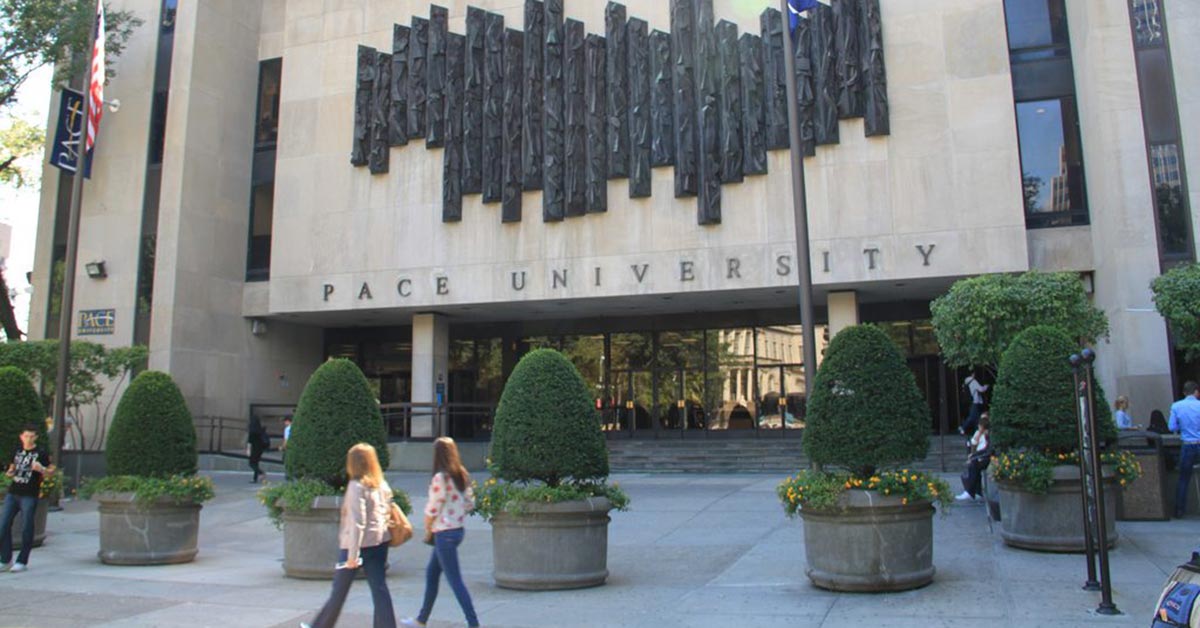
Pace University’s Elisabeth Haub School of Law ranks among the best law schools for environmental law. The school excels in the specialty, offering robust programs and courses. The law school opened in 1976 and is in White Plains, New York. Pace University’s Elisabeth Haub School of Law offers a variety of law degree programs. The Juris Doctor (JD) program provides a comprehensive legal education with opportunities to specialize in environmental law, criminal law, and international law, among others. The school offers Master of Laws (LLM) degrees in Environmental Law and Comparative Legal Studies designed for domestic and international students. The Doctor of Juridical Science (SJD) program allows for advanced scholarly research.
Pace University’s Elisabeth Haub School of Law has an acceptance rate of 53.34% for the 2023-2024 academic year. The median LSAT score for incoming students is 152, with a median GPA of 3.47. Pace University’s Elisabeth Haub School of Law has tuition for the 2024 academic year at $54,890 for full-time JD students and $41,190 for part-time JD students. LLM programs cost $45,000 per year, with additional fees for student activities, technology, and health services. Pace University’s Elisabeth Haub School of Law ranks number one in Environmental Law according to the latest U.S. News and World Report. The school is ranked 13th in Trial Advocacy and recognized for its strong Clinical Training and Dispute Resolution programs. The law school has earned a reputation for excellence in environmental law and innovative legal education, producing graduates well-prepared for diverse legal careers. Haub Law’s curriculum combines rigorous academic instruction with practical skills training, fostering a vibrant and supportive community focused on student success.
Pace University’s Elisabeth Haub School of Law offers specialized programs in environmental law, including the Environmental Law LLM and the JD Certificate in Environmental Law. The programs emphasize experiential learning through clinics, externships, and the Environmental Litigation Clinic. Unique features include the Global Center for Environmental Legal Studies and participation in international moot court competitions. The offerings provide students with hands-on experience and global perspectives in environmental law.
Notable faculty in environmental law at Pace University’s Elisabeth Haub School of Law includes Jason J. Czarnezki, who specializes in environmental and natural resources law. Joshua Galperin focuses on environmental governance and agriculture law. David N. Cassuto directs the Brazil-American Institute for Law and Environment, enhancing the program’s global perspective. Pace University’s Elisabeth Haub School of Law offers extensive clinical opportunities in environmental law through the Environmental Litigation Clinic. Students represent public interest groups, gaining hands-on litigation experience under experienced faculty supervision. The law school provides field placements and a Semester-in-Practice program, bridging classroom learning and real-world practice.
Pace University’s Elisabeth Haub School of Law boasts notable alumni, including Hiroko Muraki Gottlieb and Tarini Mehta, who have significantly impacted environmental law. Anne Carpenter, Samuel Brown, and James May appear among the 2023 Lawdragon Green 500: Leaders in Environmental Law. Robust networking opportunities, including events, Continuing Legal Education courses, and mentoring programs, support career development. The active alumni network facilitates valuable connections within the environmental law community.
Pace University’s Elisabeth Haub School of Law offers advanced environmental law courses, including Climate Change Law, Energy Law, and International Environmental Law. Electives covering Environmental Justice and Land Use Law provide specialized knowledge. The courses equip students with skills to address complex environmental issues effectively. Pace University’s Elisabeth Haub School of Law reports strong employment outcomes, including environmental law careers. The overall employment rate was 92%, with more than 85% of graduates securing full-time, long-term positions. Graduates secure positions within ten months, aided by career services and job fairs attracting over 115 companies.
3. Harvard Law School

Harvard University Law School, one of the best law schools for environmental law, provides exceptional opportunities in the field. The school’s curriculum and faculty expertise make the institution a top choice for aspiring environmental lawyers. Harvard Law School, established in 1817, is located in Cambridge, Massachusetts, and is renowned globally.
The JD program at HLS emphasizes critical thinking and practical skills, with extensive clinical and pro bono opportunities. Students engage with cutting-edge legal issues through various clinics, including individuals focused on criminal justice, health law, and environmental law. Harvard’s LL.M. program attracts legal professionals worldwide, offering a customizable curriculum that allows students to focus on their areas of interest. The S.J.D. program, one of the most advanced law degrees, prepares graduates for academic and high-level policy roles.
The acceptance rate for Harvard Law School in 2024 is 9.58%, reflecting the highly competitive nature of the admissions process. Harvard Law School’s tuition and fees are $78,692 for the 2024-2025 academic year. The total estimated cost of attendance, including tuition, fees, housing, food, books, and personal expenses, is approximately $116,500. Harvard Law School ranks fourth in the 2024 U.S. News & World Report law school rankings. Specialties include Environmental Law, ranked 10th; International Law, ranked 2nd; and Tax Law, ranked 10th. Harvard Law School has a distinguished reputation for its rigorous academic environment, influential alumni network, and significant contributions to legal scholarship and practice. Students benefit from a world-class faculty, extensive resources, and numerous opportunities for practical legal experience.
Harvard Law School, one of the best Massachusetts law schools, offers specialized programs in environmental law. The specialized environmental law program focuses on climate change, energy policy, and sustainability.
The Emmett Environmental Law and Policy Clinic provides hands-on experience with real-world environmental issues. Students participate in the Environmental Law and Policy Program, which offers courses, conferences, and research opportunities. Notable faculty in environmental law at Harvard include Jody Freeman and Richard Lazarus. Jody Freeman, renowned for her work on climate change and environmental regulation, served in the Obama administration. Richard Lazarus, an expert in Supreme Court advocacy, has represented various entities in over 40 Supreme Court cases. Andrew Mergen directs the Emmett Environmental Law and Policy Clinic, enhancing Harvard’s focus on litigation and policy.
Harvard Law School offers extensive clinical opportunities in environmental law through the Emmett Environmental Law and Policy Clinic. The clinic provides hands-on legal experience via litigation, policy, and advocacy projects. Students address greenhouse gas emissions, climate change adaptation, environmental justice, and renewable energy development. Harvard Law School offers extensive networking opportunities and boasts a network of notable alumni in environmental law. The Harvard Environmental Law Society (ELS) facilitates connections through events, conferences, and collaborative projects. Harvard’s alumni network, with over 40,000 members, offers invaluable mentoring and career advice. Notable alumni in environmental law include Jody Freeman, a leading climate change scholar, and Patrice Simms, Vice President of Litigation at Earthjustice. The alumni contribute to a vibrant network supporting current students and recent graduates in their environmental law careers.
Harvard Law School’s advanced Environmental Law courses delve into complex regulatory frameworks and case law. Students explore the intricate relationships between federal and state environmental regulations. Courses cover climate change policy, biodiversity conservation, and sustainable development. Students analyze landmark environmental cases, participate in moot court competitions, and engage in interdisciplinary projects. Practical applications include drafting legal briefs, negotiating settlements, and conducting environmental impact assessments. Harvard Law School graduates, including students in environmental law, enjoy impressive employment outcomes. The Class of 2023 saw 90.2% secure long-term, full-time legal jobs, with 96.3% having any long-term job.
4. Yale Law School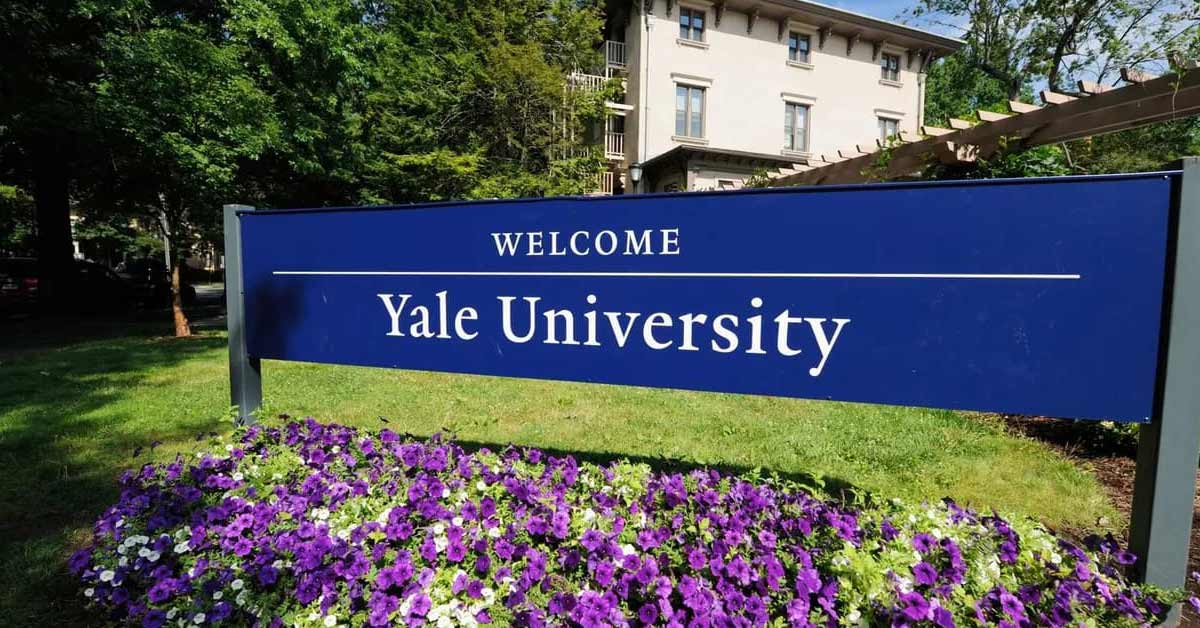
Yale Law School is renowned for its environmental law program, which is consistently ranked among the best in the country. The school, established in 1824, boasts a prestigious history and commitment to legal excellence. Located in New Haven, Connecticut, Yale Law School offers diverse degree programs catering to various academic and professional goals. The J.D. program features small class sizes and clinical training, while the LL.M. and J.S.D. focus on legal scholarship. Non-lawyers pursue the M.S.L., and joint degrees are available in collaboration with other Yale departments. Yale Law School’s acceptance rate for the class entering 2024 is approximately 5.72%. Yale Law School’s tuition and fees for the 2024-2025 academic year are $76,369, reflecting a 3.39% increase. The total annual cost of attendance is approximately $100,469.
Yale Law School offers specialized programs in environmental law, including the Environmental Protection Clinic and the Yale Center for Environmental Law and Policy. The programs provide hands-on experience and interdisciplinary research opportunities. Yale Law School features notable faculty in environmental law. Daniel C. Esty directs the Yale Center for Environmental Law and Policy. Gerald Torres focuses on environmental justice. Douglas Kysar researches climate change and torts. Joshua Macey specializes in environmental and energy law.
Yale Law School offers extensive clinical opportunities in environmental law. The Goldman Sonnenfeldt Environmental Protection Clinic provides hands-on experience with real-world issues. The Yale Center for Environmental Law & Policy advances environmental policy. The Environmental Justice Clinic addresses legal issues for marginalized communities. Yale Law School offers extensive networking opportunities through the Yale Environmental Law Association and The Courtyard online alumni community. The Tsai Leadership Program provides tailored career advice, especially in environmental law. Notable alumni in environmental law include Quentin Karpilow from Sher Edling LLP and Stephanie Safdi, a clinical educator. Daniel Esty, director of the Yale Center for Environmental Law and Policy, is among the distinguished graduates.
Yale Law School offers a comprehensive environmental law curriculum with advanced and elective courses. Environmental Law and Policy explores regulatory frameworks. Climate Change and the Law examines legal responses to climate issues. Advanced Environmental Law Practice provides practical skills through real-world projects. The International Environmental Law course addresses global environmental challenges. Land Use and Urban Planning focuses on legal aspects of urban development. The Energy Law course covers regulations and policies related to energy production and consumption. Natural Resources Law examines legal issues concerning land, water, and wildlife conservation. Students engage in interdisciplinary studies, preparing them for diverse environmental law careers. Yale Law School boasts impressive employment outcomes, including environmental law, with 96.9% of the Class of 2023 employed ten months after graduation. The Career Development Office provides robust support, facilitating connections between students, faculty, and alumni.
5. Columbia Law School

Columbia Law School, one of the best law schools for environmental law, offers unparalleled opportunities for students passionate about the field. The school was established in 1858 and is located in New York City, providing access to numerous legal and business hubs. Columbia Law School offers various law degrees tailored to different career goals. The Juris Doctor program spans three years and covers foundational courses in the first year, with electives and specialized courses in the latter years. The one-year Master of Laws program requires 24 credits, including American law and legal research. The Executive LL.M. program, targeting mid-career professionals, blends online and in-person modules over six months. The Doctor of the Science of Law program involves advanced research, generally lasting three to five years.
Columbia Law School has an acceptance rate of approximately 12.23% for the academic year 2023-2024. Columbia Law School’s tuition and fees total $81,292 for the 2024 academic year. The overall estimated cost, including living expenses, books, and supplies, reaches $113,711. Financial aid is available, with an average grant of $30,000, benefiting about 62.34% of full-time students.
Columbia Law School holds the eighth position in the 2024 U.S. News & World Report rankings. The school ranks fourth in Environmental Law, seventh in International Law, sixth in Corporate Law, and fifth in Criminal Law. Columbia Law School holds a prestigious reputation and is renowned for rigorous academic programs, influential faculty, and strong placement in elite legal and business sectors. The institution consistently produces graduates excelling globally in various legal fields and leadership roles.
Columbia Law School offers several specialized programs in environmental law, providing students with extensive opportunities in the critical field. The Environmental Law Clinic allows hands-on experience in real-world cases. Advanced courses and seminars focus on climate change, energy law, and land use. The Sabin Center for Climate Change Law facilitates cutting-edge research and policy development. Columbia Law School boasts an impressive lineup of notable faculty in environmental law. Michael Gerrard, the Andrew Sabin Professor, founded the Sabin Center for Climate Change Law. Michael Burger, the Executive Director of the Sabin Center, focuses on legal strategies for climate adaptation. Peter Lehner teaches about the environmental impacts of food production. Edward Lloyd significantly contributed to environmental litigation and policy.
Columbia Law School offers robust clinical opportunities in environmental law. The Environmental and Climate Justice Clinic addresses climate change impacts on low-income communities of color. The Environmental Practice Externship places students in environmental organizations, non-profits, and government agencies. The programs provide practical skills in legal analysis, advocacy, and client representation. Columbia Law School offers extensive networking opportunities through the Sabin Center for Climate Change Law, Earth Institute, and Columbia Center on Sustainable Investment. The Environmental and Climate Justice Clinic provides hands-on experience for aspiring lawyers. Competitions and conferences enhance professional connections in environmental law. Notable alumni in environmental law include Michael B. Gerrard, Camille Pannu, and Susan Amron.
Columbia Law School’s environmental law curriculum offers a rich selection of advanced courses and electives. Students take “Environmental Law and Policy,” which covers legal frameworks governing environmental protection. The “Climate Change Law” course delves into international, national, and local climate policies. “Natural Resources Law” focuses on legal issues related to resource management and conservation. “Energy Law” explores the regulation of energy production and distribution. The “Environmental Litigation” course emphasizes strategies for litigating environmental cases. “International Environmental Law” addresses global environmental challenges and treaties. The “Land Use Law” course examines zoning, planning, and urban development regulations. The courses provide comprehensive training for future environmental law leaders. Columbia Law School’s graduates, including environmental law specialists, achieve impressive employment outcomes, with a 95.1% rate in long-term, full-time legal positions. Prestigious employers regularly hire accomplished professionals from major law firms to public interest organizations.
6. UC Berkeley School Of Law
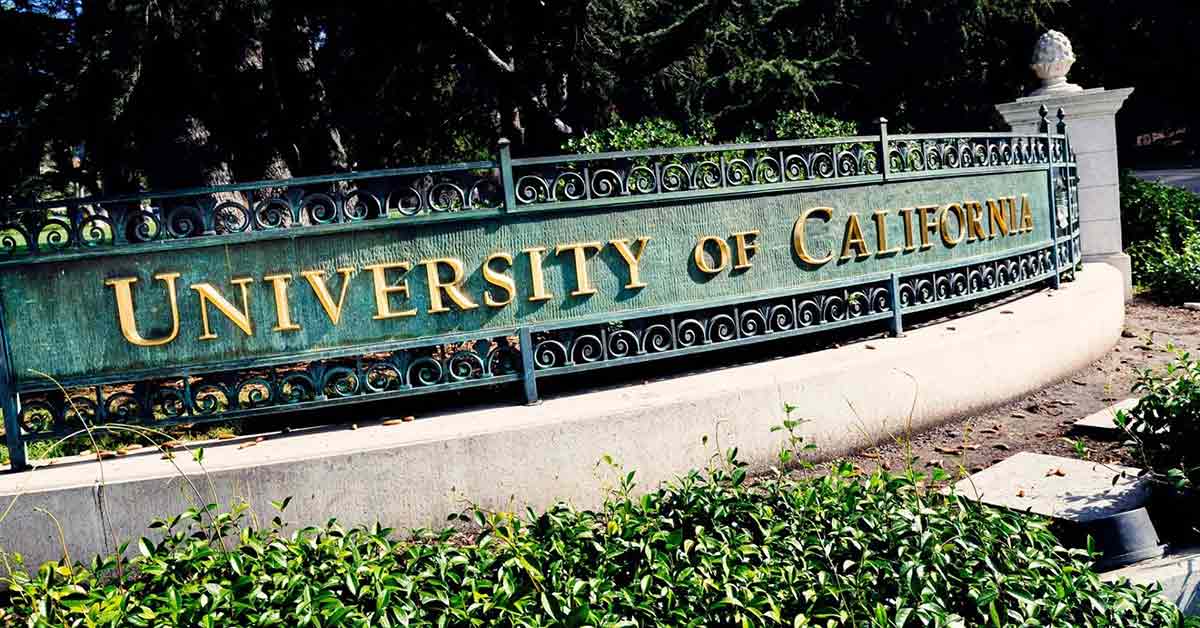
The University of California, Berkeley, School of Law ranks among the best in environmental law. Berkeley Law, established in 1894, is recognized for academic excellence and influential scholarship. The law school is situated and offers a robust curriculum and practical opportunities. The University of California, Berkeley, School of Law offers various law degrees, including the J.D., LL.M., and J.S.D., along with several concurrent and combined programs. The J.D. requires 85 units over three years, including foundational courses, moot court, and experiential learning. LL.M. students choose from Traditional, Executive, or Hybrid tracks, focusing on U.S. law. Tuition fees for the 2024-2025 academic year at the University of California, Berkeley, School of Law are $63,196 for California residents and $75,624 for non-residents. The total Cost of Attendance (COA) is approximately $100,224 for residents and $112,652 for non-residents.
The University of California, Berkeley, School of Law ranks 12th in the U.S. News & World Report’s 2024-2025 law school rankings. Berkeley Law is second in environmental law and seventh in Business Law. Berkeley Law enjoys a distinguished reputation for its academic excellence, innovative research, and strong emphasis on public service. Graduates are highly sought after by leading law firms, public interest organizations, and government agencies, reflecting the school’s commitment to producing well-rounded legal professionals.
The University of California, Berkeley, School of Law offers specialized programs in environmental law through the Center for Law, Energy & the Environment (CLEE). Berkeley Law provides extensive opportunities for students to engage in environmental law, including clinics, research projects, and policy initiatives. The University of California, Berkeley, School of Law boasts prominent faculty in environmental law. Holly Doremus is a leading scholar in environmental regulation. Daniel Farber, the Sho Sato Professor of Law, serves as Faculty Director of the Center for Law, Energy, and the Environment (CLEE), focusing on pragmatic policy solutions.
The University of California, Berkeley School of Law, one of the best California law schools, offers extensive clinical opportunities in environmental law. The Environmental Law Clinic provides hands-on legal experience through real-world cases and projects. Claudia Polsky directs students in litigation, policy analysis, and advocacy. CLEE supports interdisciplinary research, field placements, and partnerships with top environmental organizations. Berkeley Law offers numerous networking opportunities and has a notable alumni network in environmental law. The Environmental Law and Policy Program organizes public lectures and visiting speaker sessions. The Berkeley Network provides professional events, online education, and industry-specific programming in environmental law. Notable alumni include Jared Blumenfeld and Ethan Elkind, who exemplify impactful careers in environmental law.
The University of California, Berkeley, School of Law offers an extensive range of advanced and elective courses in environmental law. Students take Environmental Law and Policy, Climate Change Law, and Natural Resources Law courses. Advanced seminars include Environmental Justice, Energy Regulation, and the Environment. The curriculum features interdisciplinary courses, combining legal studies with science and public policy. Field courses and practical workshops provide hands-on experience in real-world environmental issues. Specialized topics include land use, water law, and environmental litigation. The diverse course offering equips students with comprehensive knowledge and skills to address complex environmental challenges. Berkeley Law’s Class of 2022 had a 96.38% employment rate nine months after graduation, including in environmental law. Graduates secured significant placements in California and high median salaries in private practice and public interest positions.
7. Georgetown University Law Center

Georgetown Law Center’s excellence in environmental law consistently ranks the institution among the best law schools in the field. Georgetown Law Center offers diverse law degree programs, including the Juris Doctor (J.D.). The J.D. program includes a three-year Full-Time Program and an Evening Program for working professionals. Joint degrees include the J.D./M.B.A., combining law and business education, and the J.D./M.P.P. with the McCourt School of Public Policy. The J.D./LL.M. offers specializations, and graduate programs feature an LL.M. in International Legal Studies. An LL.M. program with a London option adds international legal perspectives.
The acceptance rate at Georgetown University Law Center for the 2024 academic year is approximately 12.9%. Georgetown University Law Center’s tuition for the 2024-2025 academic year is $79,672 per year for the Full-Time J.D. program. The estimated total cost of attendance, including tuition, books, and living expenses, is around $113,450 per year for full-time J.D. students. Georgetown University Law Center ranks 14th in the United States according to U.S. News & World Report. The law school holds the top spot in Clinical Training, ranks second in Tax Law, fifth in International Law, and tenth in Environmental Law. Georgetown Law enjoys a strong reputation for excellence in legal education, with a significant focus on public service and leadership within the legal community. The law school attracts a diverse student body and offers extensive experiential learning opportunities, reinforcing its standing among top law schools globally.
Georgetown University Law Center offers specialized programs in environmental law, including the Environmental Law and Policy Program and the Environmental Law and Policy LL.M. The programs provide extensive coursework in environmental legislation, international environmental law, and climate change policy. Georgetown University Law Center boasts distinguished faculty in environmental law. Lisa Heinzerling, a leading expert, played a key role in Massachusetts v. EPA. William W. Buzbee specializes in regulatory and environmental law, addressing climate change and litigation. Sara Colangelo, Director of the Environmental Law & Justice Clinic, focuses on environmental justice. Edith Brown Weiss is a respected authority in international environmental law.
Georgetown University Law Center offers extensive clinical opportunities in environmental law. The Environmental Law & Justice Clinic (ELJC) engages students in public interest legal work, focusing on environmental justice, pollution control, natural resources, and climate. The Harrison Institute for Public Law’s Public Policy Clinic addresses climate change, health, food, and human rights issues. Georgetown University Law Center provides robust networking opportunities for environmental law students. The Georgetown Climate Center connects students with government officials, academics, and stakeholders. The Hoya Lawya Gateway platform helps students and alumni connect within Georgetown’s network. Notable alumni include Lisa Heinzerling, Edith Brown Weiss, and Sara Colangelo, who have significantly impacted environmental law.
Georgetown University Law Center offers advanced courses in environmental law, providing a comprehensive curriculum. Students enroll in specialized electives such as Environmental Law and Policy, Climate Change Law, Natural Resources Law, and International Environmental Law. The program includes advanced seminars on Environmental Justice, Regulatory Compliance, and Environmental Litigation. Students gain practical experience through simulation courses and externships. Electives focus on contemporary issues, including sustainability, biodiversity, and global environmental governance. The curriculum’s unique aspect involves real-world projects and research opportunities, preparing students for diverse careers in environmental advocacy, policy, and regulation. Comprehensive training ensures expertise in addressing complex environmental challenges. Georgetown University Law Center has impressive employment outcomes, particularly in environmental law, with 89.3% of the Class of 2023 securing long-term, full-time legal positions.
8. University Of Michigan Law School
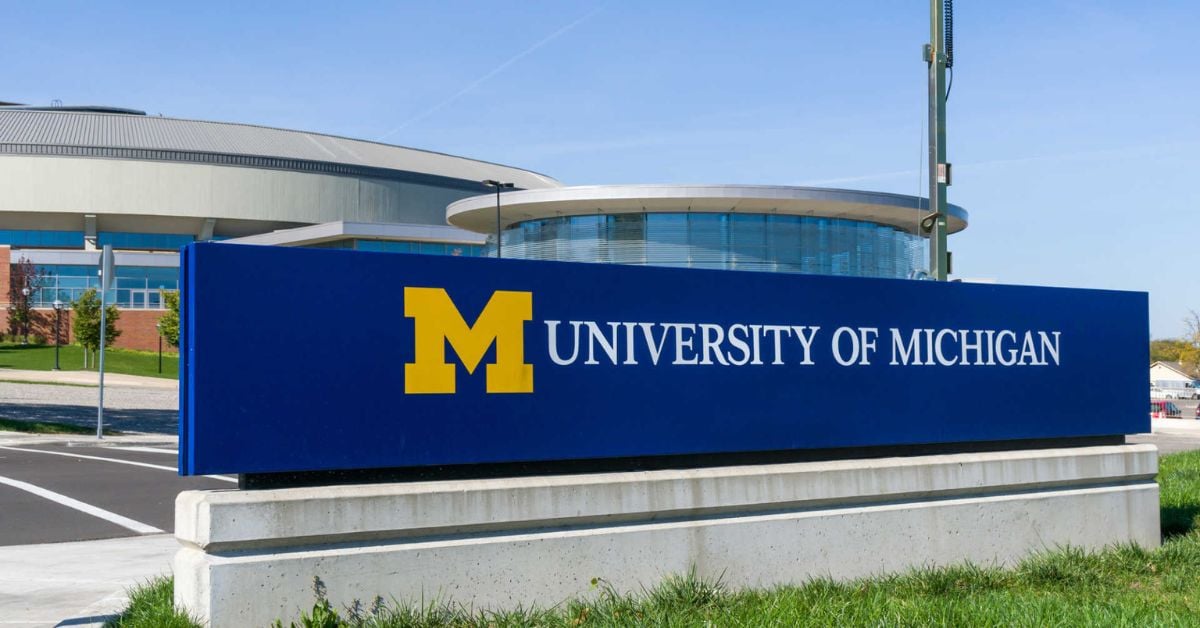
The University of Michigan Law School stands out as one of the premier institutions for environmental law. The law school provides top-tier education and opportunities in environmental law. The law school was established in 1859 in Ann Arbor, Michigan. The University of Michigan Law School offers various law degree programs tailored to different professional goals and backgrounds. The Juris Doctor (JD) program, a three-year course, starts with foundational courses in the first year. The second and third years include advanced classes, seminars, clinics, and externships. The Master of Laws (LLM) program is a one-year course for students with a non-U.S. law degree.
The University of Michigan Law School has a competitive acceptance rate of approximately 12.58% for the 2023-2024 academic year. Tuition for the University of Michigan Law School in 2023-2024 is $69,584 for residents and $72,584 for non-residents. 85.39% of students receive an average of $30,000 in grants and scholarships, with additional loan options available.
The University of Michigan Law School ranks 9th in the 2024 U.S. News & World Report rankings. The law school ranks 8th in Business/Corporate Law, 5th in Criminal Law, 17th in Environmental Law, and 6th in International Law. Cornell Law School sets a high standard in legal education and is one of the best Michigan law schools. The law school attracts top-tier students due to rigorous academic programs, a distinguished faculty, and a strong alumni network.
The University of Michigan Law School offers specialized programs in environmental law, including the Environmental Law and Policy Program (ELPP). The ELPP provides opportunities for students to engage in cutting-edge research, participate in environmental law clinics, and attend lectures and conferences featuring prominent environmental law experts. The law school offers dual degree options, combining law with environmental science and policy. The University of Michigan Law School boasts a strong faculty in environmental law. Notable faculty include Nina Mendelson, an expert in administrative and environmental law, and Jennifer Haverkamp, who specializes in international environmental law. Oday Salim focuses on environmental justice, while Alexandra Klass brings expertise in energy law and public lands.
The University of Michigan Law School offers extensive clinical opportunities in environmental law. The Environmental Law and Sustainability Clinic, directed by Professor Oday Salim, provides hands-on experience. Students represent organizations, engage in litigation, draft legal documents, and participate in policy advocacy. The clinic enhances students’ skills and contributes significantly to their professional development. The University of Michigan Law School provides extensive networking opportunities through Michigan Law Connect and the Alumni Directory. Notable alumni in environmental law include Professor David M. Uhlmann, an expert in environmental crimes and compliance. Distinguished alumni hold key positions in government, non-profits, and academia, influencing environmental policy.
The University of Michigan Law School offers a robust curriculum in environmental law, including advanced and elective courses. Students take Environmental Law and Policy, which covers major statutes and regulatory frameworks. Advanced courses include Natural Resources Law, Climate Change Law, and Environmental Justice. Electives like International Environmental Law and the Environmental Crimes Seminar provide specialized knowledge. The Environmental Law Practicum allows hands-on experience in real-world legal issues. Interdisciplinary courses, offered in collaboration with other university departments, enrich the learning experience. The courses equip students with comprehensive legal expertise to address complex environmental challenges. The University of Michigan Law School boasts impressive employment outcomes, including in environmental law, with 98% of the Class of 2023 employed.
9. Cornell Law School
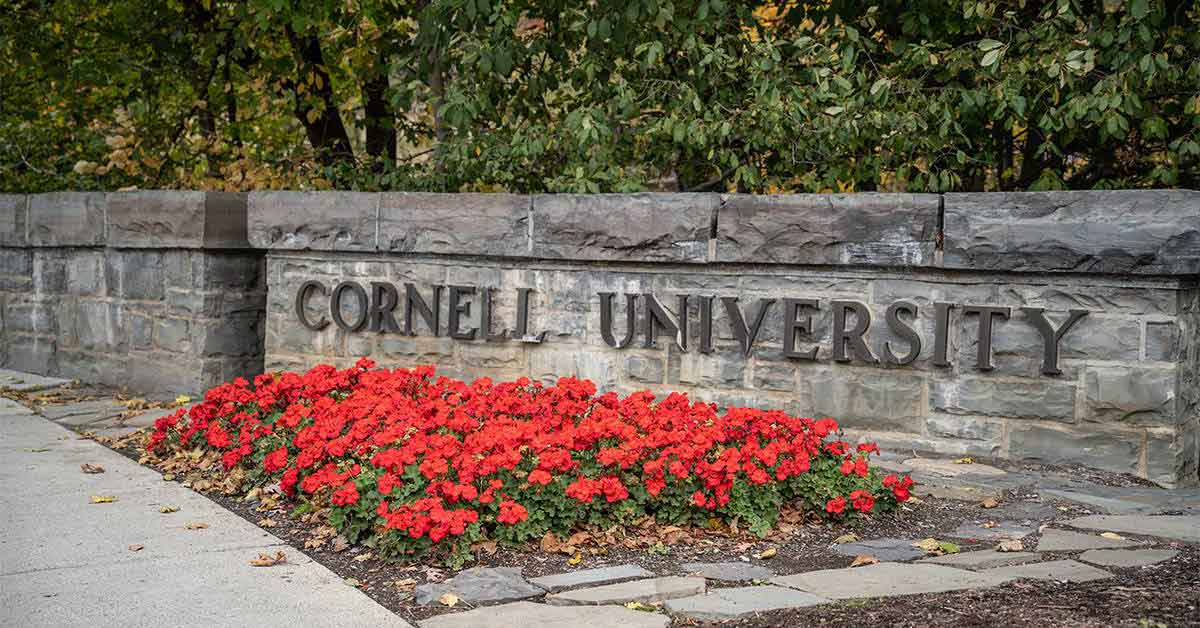
Cornell Law School, established in 1887 in Ithaca, New York, ranks among the best for environmental law, providing top-tier education and opportunities. Cornell Law School offers diverse law degrees and programs, including the three-year Juris Doctor (J.D.) that prepares students for the Bar and legal profession. The Master of Laws (LL.M.) program includes specializations in technology and entrepreneurship. The Doctor of Science of Law (J.S.D.) targets careers in legal scholarship. Business professionals benefit from the online Master of Science in Legal Studies (M.S.L.S.). The J.D./M.B.A. and international dual degrees enhance career opportunities across jurisdictions.
Cornell Law School’s acceptance rate is approximately 18.39% for the academic year 2023-2024. Cornell Law School’s tuition fees for the 2024 academic year are $77,593, with a total estimated cost of attendance of around $104,309. Significant financial aid is available, with 87.86% of full-time students receiving grants or scholarships averaging $30,000.
Cornell Law School ranks 14th in the 2024 U.S. News & World Report Best Law Schools. Specialty rankings place the school 7th in International Law, 11th in Constitutional Law, and 50th in Environmental Law. Distinguished faculty, robust career support, and strong alumni networks enhance the school’s reputation. Academic excellence combined with practical experience prepares students for leadership in the legal profession.
Cornell Law School offers specialized programs in environmental law, including the Cornell Environmental Law Society and the Water Law Clinic. The Water Law Clinic provides hands-on experience with real-world water law issues. The Environmental Law Society organizes events, lectures, and networking opportunities for students interested in environmental law.
Cornell Law School boasts notable faculty in environmental law, including Jeffrey J. Rachlinski, who specializes in cognitive and social psychology’s impact on legal processes. Allison M. Chatrchyan focuses on climate change governance and international environmental policy. Sara Bronin integrates legal and policy frameworks for sustainable urban planning. Gregory S. Alexander’s expertise in property law intersects significantly with environmental law.
Cornell Law School offers clinical opportunities in environmental law, providing hands-on experience. The Environmental Law Clinic addresses issues related to environmental protection and sustainability. Students work on cases involving environmental regulations and climate change policies. The Farmworker Legal Assistance Clinic deals with environmental issues in agricultural practices. The experiential learning approach prepares graduates effectively. Cornell Law School offers robust networking opportunities in environmental law through an extensive alumni network and professional events. The Cornell Law School Alumni Association supports professional growth and networking. Cornell Clubs worldwide provide events to build connections with the legal community. Notable alumni in environmental law include Jan Schlichtmann, known for the Anderson v. Cryovac, Inc. case. Another prominent figure is Dr. Allison M. Chatrchyan, an expert in global climate change science and international environmental policy.
Cornell Law School offers a comprehensive environmental law curriculum with advanced and elective courses. Students explore Climate Change Law, which delves into policies and regulations addressing global warming. Environmental Justice focuses on the equitable distribution of environmental benefits and burdens. The Land Use and Urban Planning course examines legal frameworks for sustainable development. The Water Law course addresses legal issues surrounding water rights and management. Energy Law explores the regulation of energy production and consumption. The Environmental Litigation course provides practical skills for handling environmental disputes. The courses equip students with the knowledge and expertise needed to tackle complex environmental legal challenges. Cornell Law School graduates, including environmental law lawyers, have impressive employment outcomes, with 96.6% securing long-term jobs.
10. UCLA School Of Law

UCLA School of Law, established in 1949 in Los Angeles, California, stands as a leading institution for environmental law. The school offers a robust curriculum and diverse opportunities for hands-on experience.
UCLA School of Law offers a range of degree programs tailored to diverse career goals. The Juris Doctor (J.D.) program trains students to become skilled lawyers with specializations in Environmental Law and Business Law. The Master of Laws (LL.M.) provides nine specializations for lawyers seeking deeper expertise. The Master of Legal Studies (M.L.S.) serves professionals needing comprehensive legal understanding who are available full-time, part-time, or online. The Doctor of Juridical Science (S.J.D.) focuses on advanced legal research. Joint degree programs with other UCLA departments enhance multidisciplinary education.
The acceptance rate for UCLA School of Law is 16.8% for the 2023-2024 academic year. Tuition fees for UCLA School of Law in the 2024-2025 academic year are $59,132 for California residents and $71,377 for non-residents in the J.D. program. UCLA School of Law holds the 13th position among national law schools, according to US News & World Report. Environmental Law is ranked 5th, and Business/Corporate Law stands at 11th. UCLA School of Law enjoys a stellar reputation for its innovative curriculum, distinguished faculty, and commitment to public interest law.
UCLA School of Law offers specialized programs in environmental law, including the Emmett Institute on Climate Change and the Environment. The institute focuses on legal solutions to environmental issues and provides unique opportunities for research and advocacy. The Environmental Law Clinic allows students to work on real-world cases, addressing critical environmental challenges. The Journal of Environmental Law and Policy publishes scholarly work, fostering academic dialogue. UCLA School of Law features notable faculty in environmental law. Edward A. Parson specializes in climate change policy and solar geoengineering governance. Ann Carlson has served in the Biden-Harris Administration and focuses on air pollution and climate change law. William Boyd excels in environmental law and energy policy.
UCLA School of Law offers clinical opportunities in environmental law, providing hands-on experience. The Frank G. Wells Environmental Law Clinic involves students in significant litigation and regulatory matters. The California Environmental Legislation and Policy Clinic allows students to experience the legislative process. The clinics prepare students for impactful careers in environmental law. UCLA School of Law offers extensive networking opportunities in environmental law. The UCLA Law Alumni Association connects over 22,000 alumni, supporting professional development in environmental law. Notable alumni in environmental law include Sean Anderson, Hon. Jacqueline Nguyen, Eugene Volokh, and Paul J. Watford.
UCLA School of Law offers a robust selection of advanced courses and electives in environmental law. Students take Climate Change Law and Policy, focusing on legal responses to global warming. Environmental Justice examines legal strategies to address environmental inequalities. Water Law covers the allocation and regulation of water resources. The Energy Law course explores the legal aspects of energy production and use. Land Use Regulation delves into planning and zoning laws. The Environmental Law Practicum provides hands-on experience with real-world cases. The courses prepare students to tackle complex environmental legal issues effectively. UCLA School of Law boasts a 96.7% employment rate for graduates, including environmental law specialists, securing full-time, long-term positions. The Office of Career Services and the Office of Public Interest Programs provide extensive support for job placement and career development.
11. Lewis & Clark Law School
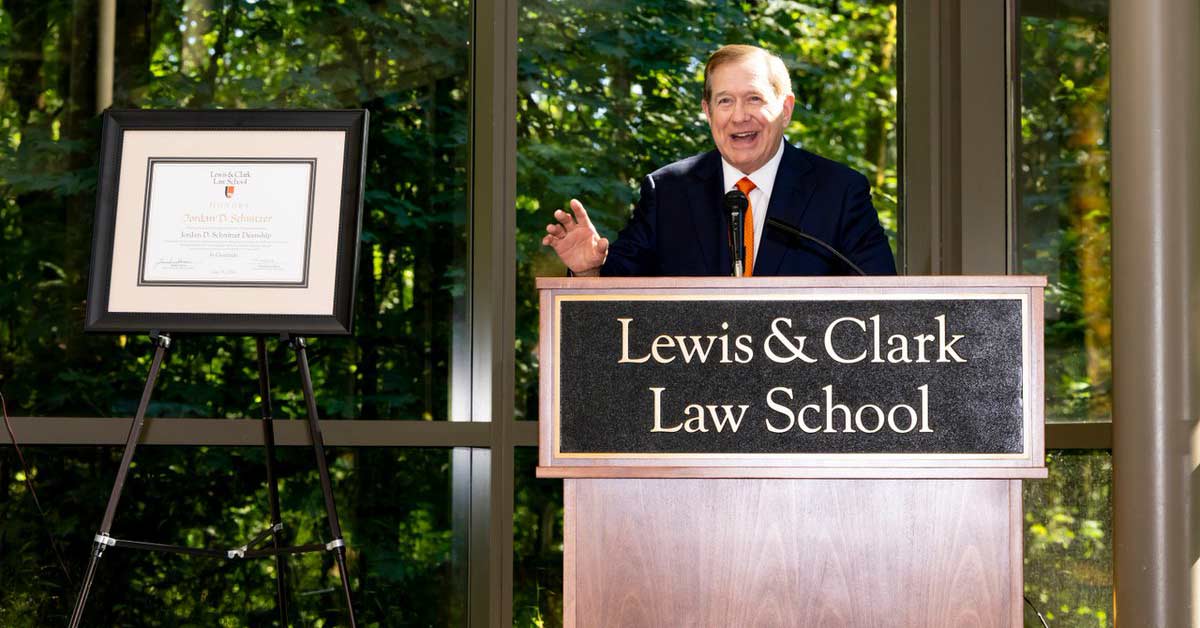
Lewis & Clark Law School stands as one of the premier institutions for environmental law education. Lewis & Clark, situated in Portland, Oregon, was established in 1915, blending a rich history with modern legal education. Lewis & Clark Law School offers degrees, including the Juris Doctor (J.D.), Master of Laws (LL.M.), and Master of Studies in Law (M.S.L.). Specializations in environmental, natural resources, energy law, and animal law are available. The school provides joint degree options like the J.D./LL.M. in Environmental Law. Extensive externship programs, moot courts, and various law centers enhance practical training opportunities.
The acceptance rate for Lewis & Clark Law School for the academic year 2023-2024 is 67.88%. Tuition and fees for Lewis & Clark Law School in the 2024-2025 academic year are $59,070. Estimated living costs bring the total cost of attendance to $86,140. Lewis & Clark Law School is ranked 82nd among national law schools, according to US News & World Report. The school’s environmental law program is ranked 3rd, showcasing its strength in the specialty. Other notable specialty rankings include the Part-Time Law Program at 15th and the Legal Writing program at 16th.
The law school offers a supportive and collaborative learning environment, with a strong emphasis on practical skills and real-world application of legal theory.
Lewis & Clark Law School offers specialized programs in environmental law, including a J.D. with a certificate in Environmental, Natural Resources, and Energy Law. The LL.M. in Environmental, Natural Resources, and Energy Law allows deeper exploration of the fields. The joint J.D./LL.M. degree provides comprehensive expertise. Extensive externships, clinics, and the Earthrise Law Center offer practical experiences. A top-ranked program in the nation, the law school uniquely combines rigorous academics with practical training in environmental law.
Notable faculty at Lewis & Clark Law School specialize in environmental law. Melissa Powers focuses on climate change and energy law, directing the Green Energy Institute. Chris Wold, an expert in international environmental law, founded the International Environmental Law Project. Daniel Rohlf co-founded the Earthrise Law Center, engaging students in domestic environmental litigation. Erica Lyman significantly contributes to international wildlife law through the International Environmental Law Project. Lewis & Clark Law School, one of the best Oregon law schools, offers extensive clinical opportunities in environmental law. The Earthrise Law Center provides hands-on experience in environmental litigation and advocacy. The International Environmental Law Project involves students in international cases and global negotiations. The Global Law Alliance focuses on the intersection of animal and environmental law. The programs develop practical skills and contribute to environmental protection and advocacy.
Lewis & Clark Law School offers robust networking opportunities in environmental law through programs and events. The Environmental Law Spring Symposium connects students and professionals to discuss critical issues. The Earthrise Law Center and International Environmental Law Project provide hands-on experiences and networking with lawyers and policymakers. Notable alumni in environmental law include Chris Wold, founder of the International Environmental Law Project. Melissa Powers, director of the Green Energy Institute, has made significant contributions to environmental law and policy.
Lewis & Clark Law School offers a diverse range of advanced and elective courses in environmental law. Students take Advanced Environmental Law, focusing on complex regulatory issues. Energy Law covers renewable energy policies and legal challenges. Environmental Justice addresses legal strategies for protecting marginalized communities. The Land Use course explores zoning and sustainable development laws. Wildlife Law examines regulations for species protection. International Environmental Law involves global treaties and compliance mechanisms. The Environmental Litigation Clinic provides hands-on experience with real cases. The offerings prepare students for specialized careers in environmental law, combining rigorous academics with practical training.
Lewis & Clark Law School’s Class of 2023 boasts over 90% employment within ten months. The employment rate in environmental law is impressive, with nearly 85% of positions requiring or preferring a Juris Doctor (JD) degree. Graduates work in law firms, public interest, and government. The school’s career services provide strong support.
12. American University Washington College Of Law
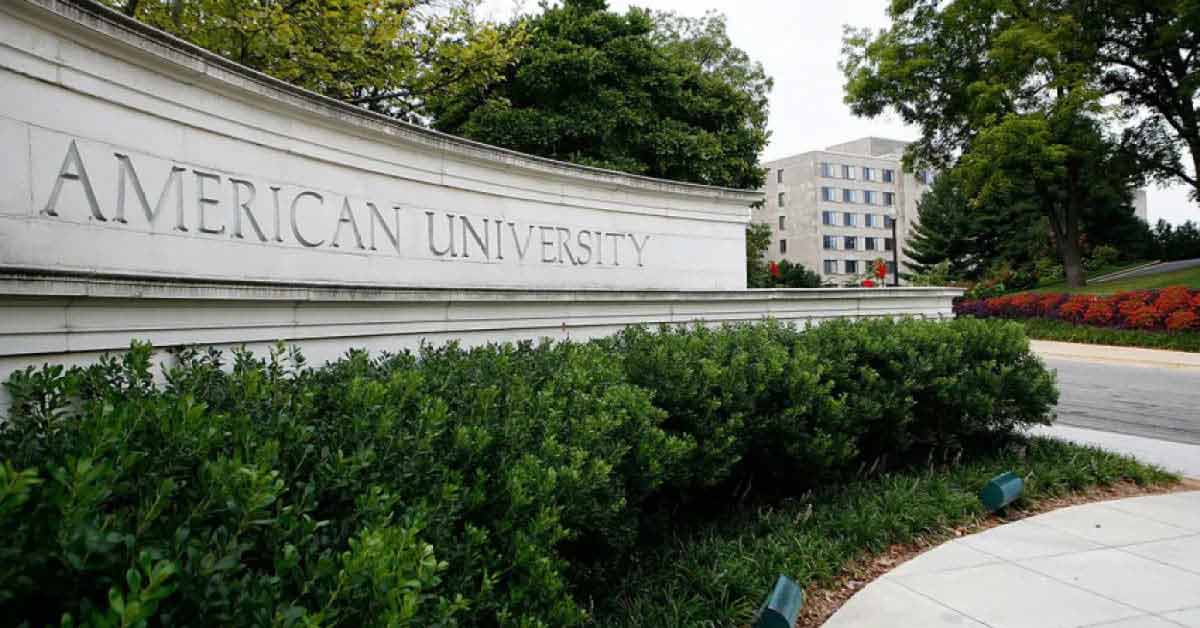
American University Washington College of Law (AUWCL) is renowned as one of the best law schools for environmental law. The program’s comprehensive curriculum and esteemed faculty emphasize the specialization. AUWCL, established in 1896, is located in Washington, D.C., providing students with unique access to major legal and policy-making institutions. American University Washington College of Law (AUWCL) offers diverse law degrees tailored to various professional and academic goals. The Juris Doctor (JD) program, available full-time or part-time, provides a comprehensive legal education with specialization opportunities through clinics and externships. Several Master of Law (LLM) programs, including Advocacy, Gender, International, and Comparative Law, cater to specific legal fields. The Master of Legal Studies (MLS) online degree suits professionals needing legal knowledge without intending to practice law.
The acceptance rate at American University Washington College of Law (AUWCL) for the 2024 admissions cycle is 35.7%. Tuition for the 2024-2025 JD program at American University Washington College of Law is $32,207 per semester for full-time and $19,088 for part-time students.
American University Washington College of Law ranks 98th in the nation for law schools according to the 2023-2024 U.S. News & World Report. The school’s Clinical Law program is ranked second. International Law is ranked ninth, and Environmental Law is ranked seventh. American University Washington College of Law enjoys a reputation for strong academic programs and a commitment to public service and diversity. The school provides students with numerous opportunities for experiential learning and professional development.
American University Washington College of Law offers specialized programs in environmental law, including the Program on Environmental and Energy Law (PEEL). The Environmental Law Society provides students with practical experience through projects and events. The school hosts the Environmental Law Moot Court, promoting skills in litigation. Distinctive features include partnerships with governmental agencies and international organizations, providing unique opportunities for internships and research in environmental law.
American University Washington College of Law features notable faculty in environmental law. David Hunter, an expert in international environmental law, influences global policy. Marcos Orellana directs the Global Toxics and Human Rights Project and serves as UN Special Rapporteur. William J. Snape III directs the Program on Environmental and Energy Law, focusing on energy and advocacy. American University Washington College of Law provides extensive clinical opportunities in environmental law. The Environmental Advocacy Clinic offers hands-on experience in litigation and policy work. Students engage directly with environmental issues, representing clients in real cases. Practical training is enhanced by partnerships with governmental agencies and international organizations.
American University Washington College of Law offers extensive networking opportunities in environmental law. The Environmental Law Society hosts events connecting students with professionals. The Alumni Mentor Database provides career advice and informational interviews. Notable alumni in environmental law include Elizabeth Klein, Deputy Secretary of the Interior, and Melanie Nakagawa, Senior Director for Climate and Energy at the White House.
American University Washington College of Law offers a comprehensive curriculum in environmental law. Advanced courses include Environmental Law, International Environmental Law, and Climate Change Law. Electives like Natural Resources Law, Energy Law, and Wildlife Law allow students to specialize further. Clinics and externships provide practical experience in real-world settings. Seminars on Environmental Justice and Sustainable Development explore current issues and policies. Specialized courses in water law and toxic substances regulation enhance expertise. The program integrates theory and practice, equipping students to tackle complex environmental challenges globally. Graduates of the AUWCL Class of 2023 secured long-term, full-time legal jobs across various sectors. 79.2% of the graduates obtained long-term, full-time legal jobs across various sectors, including environmental law
13. Vermont Law School
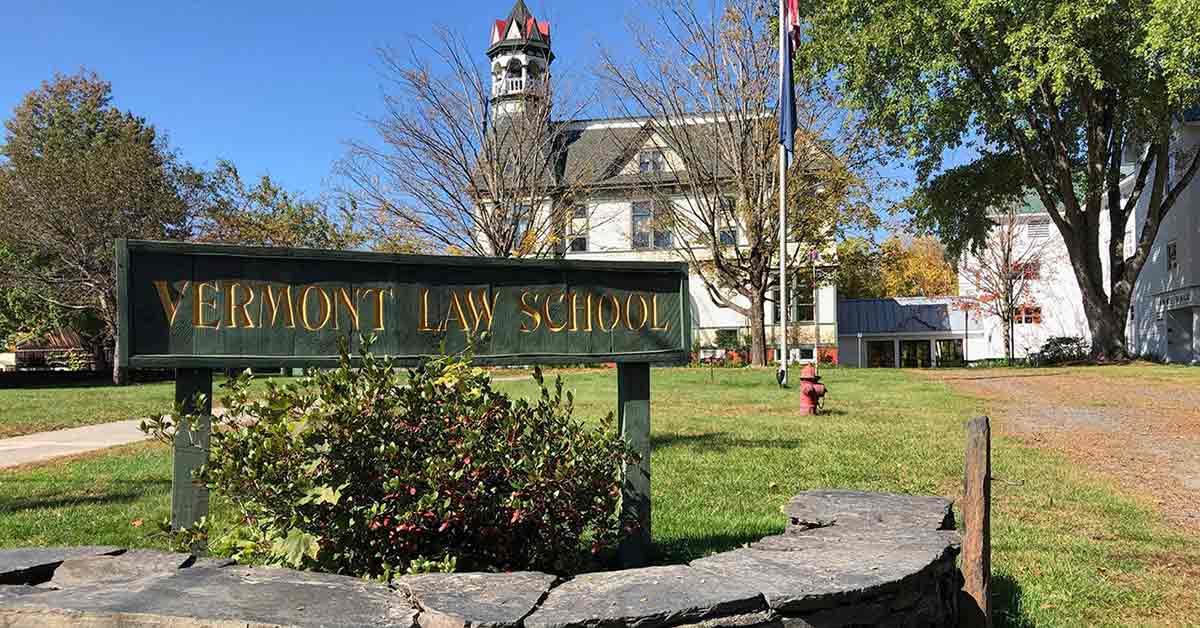
Vermont Law School stands out as one of the premier institutions for environmental law education. Vermont Law School, established in 1972, is situated in the town of South Royalton. Vermont Law and Graduate School offers a variety of law degrees for different career paths and time commitments. The Traditional Three-Year JD prepares students for general practice or specialized careers in environmental, energy, international, or criminal law. The Accelerated Two-Year JD allows completion in two years by attending fall, spring, and summer classes. The Online Hybrid JD combines online coursework with minimal on-campus residency, taking about three years and one semester. Several master’s programs include Master of Environmental Law and Policy, Master of Energy Regulation and Law, and Master of Food and Agriculture Law and Policy.
Vermont Law School has an acceptance rate of approximately 64.19% for the 2023-2024 academic year. The tuition fee for Vermont Law School for the academic year 2023-2024 is $53,768, reflecting a 4% increase from the previous year’s $51,700. The total estimated cost of attendance, including all expenses, is $76,140. Vermont Law School is ranked #168 in the overall 2024 U.S. News & World Report law school rankings. The school’s Environmental Law program ranked #4 and Clinical Law at #80. Vermont Law School ranks among the top in environmental law, demonstrating a strong commitment to environmental issues. Vermont Law School offers specialized programs in environmental law, including a JD with an Environmental Law concentration and a Master of Environmental Law and Policy (MELP). Unique opportunities include the Environmental Advocacy Clinic, where students gain hands-on experience in environmental litigation and policy work. Partnerships with organizations enhance learning experiences, notably through the Environmental and Natural Resources Law Clinic and the U.S.-Asia Partnerships for Environmental Law. Comprehensive approaches to environmental legal education and practical training set Vermont Law School apart.
Vermont Law School boasts notable faculty in environmental law. David B. Firestone specializes in environmental law, contracts, and international law. Jennifer K. Rushlow, Dean of the Environmental Law Center, focuses on climate change and environmental health law. Mark Latham emphasizes intersections between corporate real estate and environmental law. Mia Montoya Hammersley leads the Environmental Justice Clinic, advocating for indigenous rights. Vermont Law School offers extensive clinical opportunities in environmental law. The Environmental Advocacy Clinic (EAC) allows students to work on real cases involving critical issues. The Environmental Justice Clinic (EJC) focuses on representing communities disproportionately affected by environmental harms. The Advanced Environmental Advocacy Clinic provides a more in-depth experience, allowing students greater responsibility.
Vermont Law and Graduate School offers robust networking opportunities and boasts notable alumni in environmental law. The Environmental Law Society engages students with professionals through events and panels. The Environmental Advocacy and Environmental Justice Clinics provide hands-on experience. The strong alumni network supports students through mentoring and job placements. Gordon Merrick, Lauren Wustenberg, and Suhasini Ghosh exemplify successful alumni in environmental law.
Vermont Law School offers a diverse range of advanced and elective courses in environmental law. Students take Advanced Environmental Legal Research, focusing on specialized research skills. Climate Change and the Law examines legal responses to climate issues. The Environmental Law Seminar provides an in-depth analysis of current environmental law topics. Land Use Regulation explores legal frameworks governing land use and planning. Natural Resources Law covers laws related to natural resource management. Students interested in energy policy enroll in Energy Law and Policy. The Environmental Justice course addresses the legal aspects of environmental equity. The courses equip students with comprehensive knowledge and skills for careers in environmental law. Vermont Law and Graduate School’s employment outcomes for 2023 reflect strong performance among graduates, including environmental law. The law school has an employment rate of about 81.82% for its graduates. The school equips students with specialized skills through rigorous academic programs and extensive practical experiences.
14. George Washington University Law School
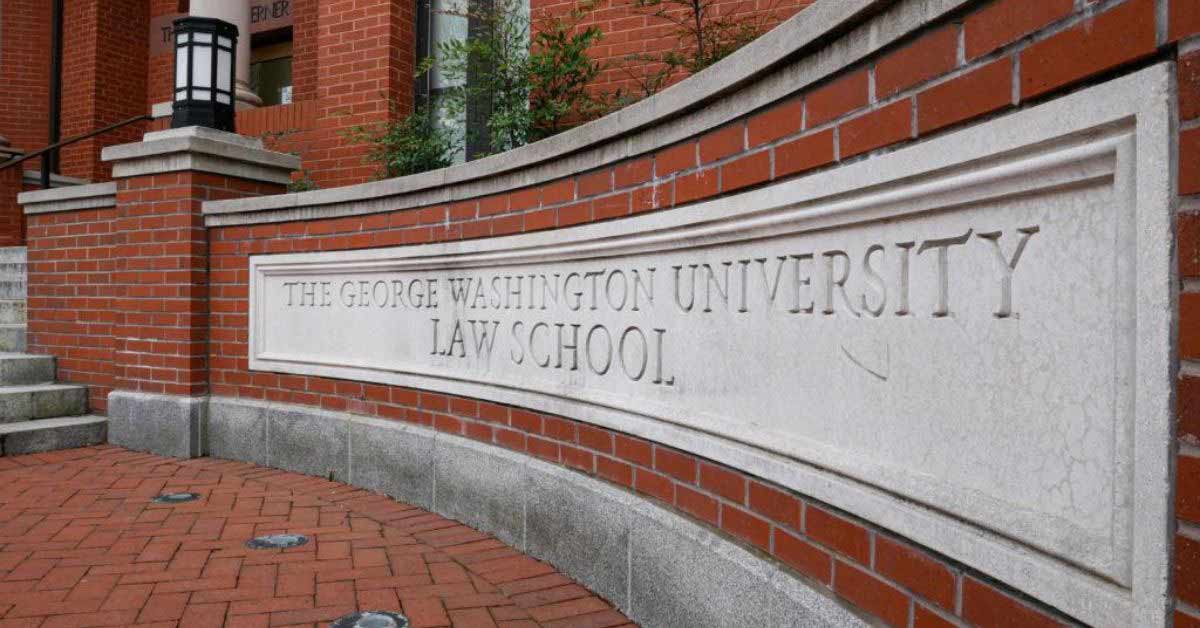
George Washington University Law School stands among the premier institutions for environmental law. George Washington University Law School, established in 1865, is located in Washington, D.C. Students benefit from proximity to major legal and political institutions, including the U.S. Supreme Court and numerous international organizations. George Washington University Law School (GW Law) offers a diverse range of law degrees to cater to various academic and professional aspirations. The Juris Doctor (JD) degree serves as the standard law degree available for full-time and part-time study. Joint JD programs collaborate with other GW schools, allowing students to earn dual degrees like JD/MBA, JD/MA, and JD/MPH, among others. The Master of Laws (LLM) degree is a postgraduate program offering specialized study in Business and Finance Law, Environmental Law, and International and Comparative Law. Students design their own course of study, incorporating traditional courses, seminars, and practical experiences.
The acceptance rate at George Washington University Law School (GW Law) is 28.72% for 2023-2024. George Washington University Law School (GW Law) tuition for full-time JD students is $69,740 for the 2024-2025 academic year, with total costs of around $100,000. Financial aid is available, with over 80% of students receiving average awards of $25,000.
George Washington University Law School ranks 41st among national law schools, according to US News & World Report. The school excels in several specialty areas: Environmental Law ranks 17th, International Law ranks 9th, and Health Care Law ranks 19th. The school offers students unique opportunities for internships and careers in federal agencies, non-profits, and private firms. The law school maintains a reputation for producing graduates who excel in public interest law and government service.
George Washington University Law School offers specialized programs in environmental law. The programs include a Master of Laws (LLM) in Environmental Law, a JD concentration in Environmental Law, and a certificate in Environmental and Energy Law. Unique features include hands-on experience through externships, clinics, and field placements in Washington, D.C. George Washington University Law School boasts notable faculty in environmental law. Robert L. Glicksman, the J.B. and Maurice C. Shapiro Professor of Environmental Law, is an expert in environmental, natural resources, and administrative law. He has authored numerous influential publications and co-authored key casebooks, including “Environmental Protection: Law and Policy.” Randall S. Abate, the Assistant Dean for Environmental Law Studies, contributes significantly to the field.
George Washington University Law School provides robust clinical opportunities in environmental law through the Jacob Burns Community Legal Clinics. Students gain hands-on experience with real cases involving environmental and energy law. The Field Placement Program enhances practical learning by placing students in externships with judges, government agencies, and non-profit organizations. George Washington University Law School, one of the best Washington law schools, offers extensive networking opportunities in environmental law. The Environmental and Energy Law Program in Washington, D.C., enables students to connect with professionals at events like the J.B. & Maurice C. Shapiro Environmental Law Symposium. Notable alumni include Carol M. Browner, former Administrator of the Environmental Protection Agency, and Robert W. Sussman, former Senior Policy Counsel at the EPA.
George Washington University Law School offers a comprehensive curriculum in environmental law featuring advanced and elective courses. Students take Air Pollution Control, Water Pollution Control, and Control of Solid and Hazardous Wastes. The curriculum includes Energy Law and Policy, Natural Resources Law, and International Environmental Law. Students engage in practical learning through the Environmental Law Clinic and gain real-world experience. Courses emphasize litigation, regulatory compliance, and policy development, preparing students for diverse careers in environmental law. Research projects, including a thesis or detailed research papers, allow students to deepen their expertise and contribute to the field. George Washington University Law School, including graduates in environmental law, boasts an impressive employment rate. 89.8% of 2023 graduates secured long-term, full-time legal jobs, with 95.3% in any long-term job and 95.1% in any full-time job.
15. University Of Oregon School Of Law
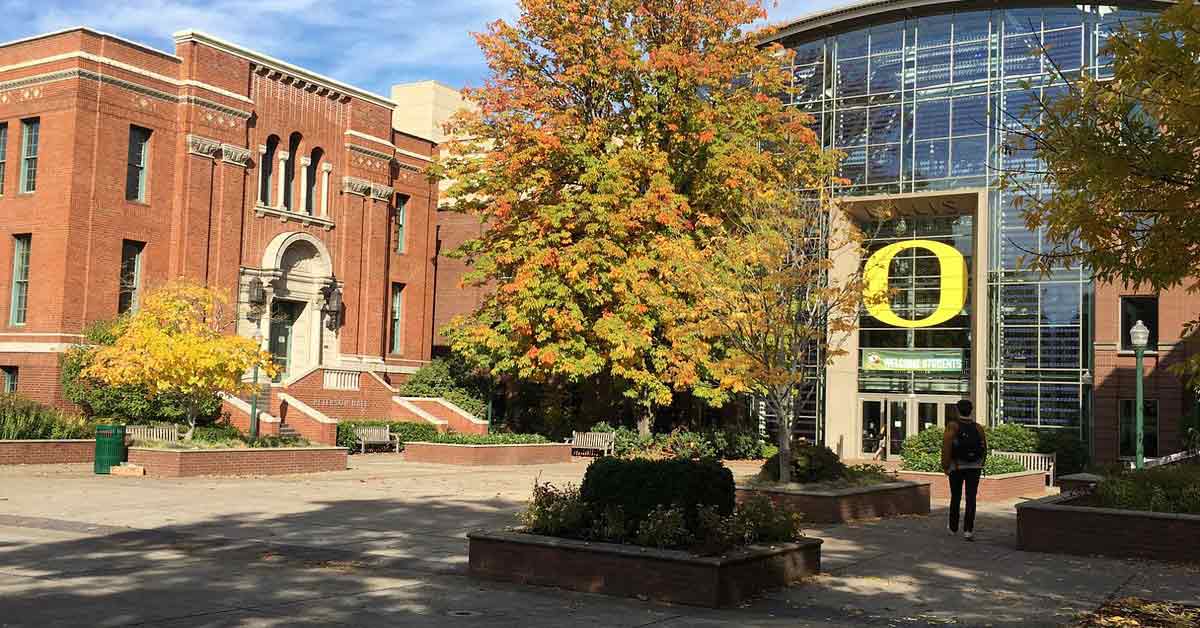
The University of Oregon School of Law stands out as one of the best law schools for environmental law, offering top-ranked programs and extensive clinical opportunities. The school, founded in 1884, is located in Eugene, Oregon, and provides a comprehensive legal education. The University of Oregon School of Law offers a comprehensive legal education. The JD program emphasizes practical skills and ranks nationally in legal writing, environmental law, and dispute resolution. The LLM program caters to advanced legal study, ideal for international and domestic students. High-achieving undergraduates pursue the accelerated 3+3 Program. Specialized clinics and institutes enhance learning and career readiness, including the Business Law Clinic and Oregon Summer Sports Law Institute.
The University of Oregon School of Law has an acceptance rate of 75.23% for the academic year 2023-2024. The tuition fees for the 2024-2025 academic year at the University of Oregon School of Law are $48,516 annually for Oregon residents and $60,414 annually for non-residents. The total cost of attendance is approximately $69,684 for residents and $81,582 for non-residents. The University of Oregon School of Law ranks #82 nationally according to U.S. News & World Report. The law school ranks highly, with Environmental Law at #7, Legal Research and Writing at #1, and Dispute Resolution at #11. The school’s reputation for producing practice-ready graduates makes the institution one of the best Oregon law schools. The emphasis on environmental law and legal writing showcases the dedication to specialized legal education and advocacy.
The University of Oregon School of Law offers specialized programs in environmental law. The programs include the Environmental and Natural Resources Law Center, the Energy Law and Policy Project, and the Food Resiliency Project. The programs provide hands-on experience through clinics, fellowships, and internships, emphasizing practical skills and policy impact. The University of Oregon School of Law features notable faculty members recognized for their expertise in environmental law. Mary Wood, a Philip H. Knight Professor of Law, is renowned for her pioneering work in Atmospheric Trust Litigation, which holds governments accountable for reducing carbon emissions. John Bonine, a professor of law, is a pioneer in public interest environmental law, contributing significantly to the field’s development.
The University of Oregon School of Law provides extensive clinical opportunities in environmental law through the Environmental and Natural Resources (ENR) Law Center. The Environmental Law Clinic offers practical training for students to work on real-world cases. ENR Center fellowships involve working on environmental projects with faculty and community stakeholders. The Environmental and Natural Resources Law LLM program includes clinic participation, enhancing expertise and practical skills.
The University of Oregon School of Law offers a robust selection of advanced courses and electives in environmental law. Students enroll in Environmental Law, Natural Resources Law, and Energy Law. Specialized courses include Climate Change Law and Policy, Water Law, Land Use Law, and Wildlife Law. The program features Environmental Justice, focusing on the equitable distribution of environmental benefits and burdens. The Administrative Law and Environmental Litigation provide practical skills for navigating regulatory frameworks. The offerings ensure a comprehensive education, preparing students for diverse environmental law and policy careers. The University of Oregon School of Law boasts an 89% employment rate for the Class of 2023, including environmental law placements. Graduates find opportunities in diverse fields, benefitting from the Center for Career Planning and Professional Development’s extensive support.
16. Vanderbilt Law School

Vanderbilt University Law School stands as one of the top institutions for environmental law. The law school excels in preparing students for careers in environmental advocacy and policy. Vanderbilt University Law School, located in Nashville, Tennessee, was established in 1874. Vanderbilt University Law School offers a comprehensive range of law degrees and programs catering to diverse professional goals. The Juris Doctor (J.D.) program features a flexible curriculum with specializations in business law, intellectual property, and criminal justice, complemented by practical experiences through clinics, externships, and internships. The Master of Laws (LL.M.) program targets international attorneys, providing tracks in General Law, Law & Business, and a Thesis Track to prepare students for global legal careers. The unique six-year Ph.D. in Law and Economics dual-degree program integrates law and economics, ideal for academic, governmental, and policy-oriented careers.
The acceptance rate for Vanderbilt University Law School for the 2023-2024 academic year is 16.76%. The tuition fee for Vanderbilt University Law School for the 2024-2025 academic year is $73,148. 84.56% receive financial aid, with an average grant of $33,000. Vanderbilt University Law School ranks 19th in the U.S. News & World Report’s 2024 annual law school rankings. The law school ranks 10th in Environmental Law, 23rd in Intellectual Property Law, and 47th in Health Care Law. The school has a reputation for fostering a collaborative environment, emphasizing scholarship and practical skills, and preparing students for diverse legal careers.
Vanderbilt University Law School offers specialized programs in environmental law, focusing on interdisciplinary studies and practical training. The Energy, Environment, and Land Use Program provides students with comprehensive knowledge of environmental regulation and policy. The Environmental Law and Policy Annual Review (ELPAR) allows students to engage in cutting-edge legal scholarship. Vanderbilt University Law School boasts a strong faculty specializing in environmental law. J.B. Ruhl, holding the David Daniels Allen Distinguished Chair in Law, is a prominent figure in the field. David has been involved in significant research on ecosystem services and climate change litigation.
Michael Vandenbergh, a David Daniels Allen Distinguished Chair of Law, is another leading expert at Vanderbilt. The faculty members contribute significantly to Vanderbilt’s reputation in environmental law.
Vanderbilt University Law School offers clinical opportunities through the Energy, Environment, and Land Use (EELU) Program. Students engage in the Climate Change Research Network, focusing on greenhouse gas emissions. The Environmental Law and Policy Annual Review (ELPAR) allows collaboration with the Environmental Law Institute. Clinics provide practical experience in environmental law cases.
Vanderbilt University Law School offers extensive networking opportunities for students interested in environmental law. The Energy, Environment, and Land Use (EELU) Program provides platforms to connect with professionals and alumni. Collaboration with the Vanderbilt Institute for Energy and the Environment and the Vanderbilt Center for Environmental Management Studies enhances student engagement in research and policy discussions. Career Services organizes career fairs and networking events called “Mingles,” facilitating connections with potential employers. Alumni, including J.B. Ruhl, a leading expert in environmental law, support students through networking inquiries and job placements. Ruhl’s influential scholarly work on climate change and ecosystem services significantly impacts environmental policy and law.
Vanderbilt University Law School offers a diverse range of advanced and elective courses in environmental law. The curriculum includes Environmental Law and Policy, focusing on regulatory frameworks and policies affecting the environment. Students take courses in Climate Change Law, which examines legal responses to climate issues. The Energy Law course explores the regulation of energy production and distribution. Land Use Planning deals with legal aspects of urban and regional planning. The Natural Resources Law course covers the management of public lands and natural resources. The Environmental Litigation and Toxic Torts course focuses on legal strategies in environmental disputes and toxic substance regulations. Vanderbilt University Law School boasts impressive employment outcomes for graduates, including environmental law careers. The class of 2023 achieved a 96% employment rate within ten months of graduation.
How To Choose The Best Environmental Law School?
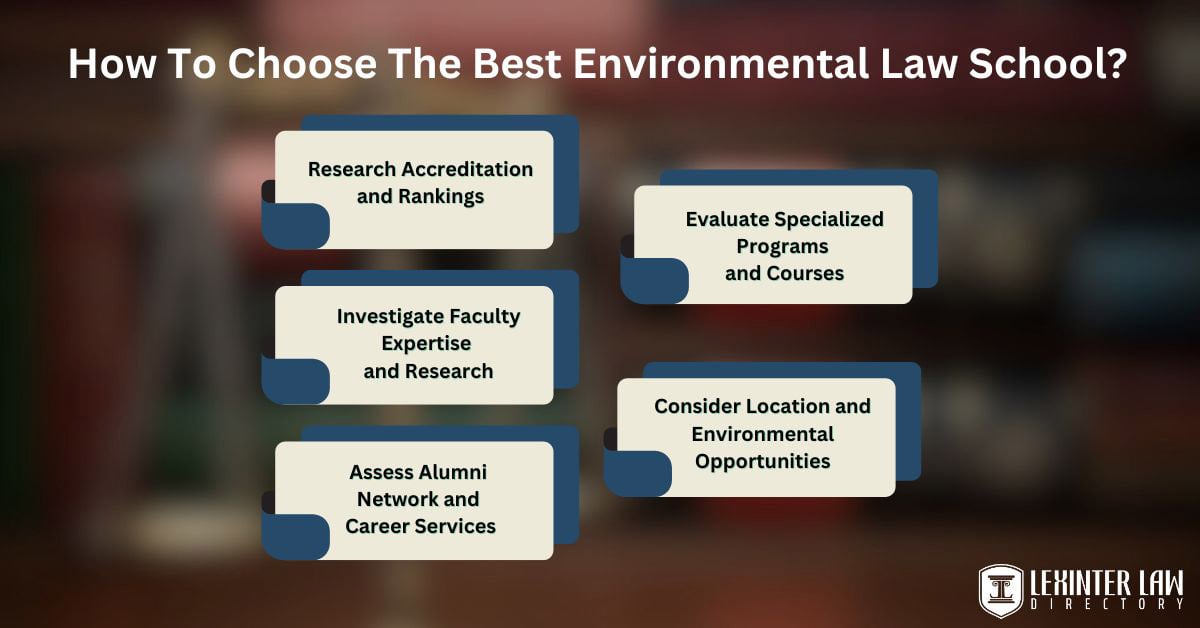
To choose the best environmental law school, follow the five steps listed below.
- Research Accreditation and Rankings. Checking accreditation and rankings is the first step in choosing the best environmental law school. Accredited programs meet quality standards essential for education. Rankings from sources like U.S. News & World Report provide insight into the school’s reputation and program strength. The rankings help identify top environmental law schools with excellent academic and professional opportunities.
- Evaluate Specialized Programs and Courses. Examining specialized programs and courses offered by environmental law schools ensures they align with specific interests and career goals. Look for schools with robust environmental law curricula, including climate change, natural resources law, and environmental justice courses. Schools offering clinical programs and internships in environmental law provide practical experience and professional connections.
- Investigate Faculty Expertise and Research. Faculty expertise plays a crucial role in choosing the best environmental law school. Professors with strong backgrounds in environmental law, significant publications, and involvement in major environmental cases greatly enhance education. Schools with faculty actively engaged in environmental research offer students opportunities to participate in cutting-edge projects and gain valuable insights into the field.
- Consider Location and Environmental Opportunities. Location significantly impacts the choice of an environmental law school. Schools situated in regions with rich natural resources, active environmental organizations, and government agencies provide excellent opportunities for internships, externships, and fieldwork. Proximity to the resources allows students to engage directly with environmental issues and develop practical skills essential for their careers.
- Assess Alumni Network and Career Services. Strong alumni networks and career services are vital for success in environmental law. Schools with active alumni networks provide valuable mentorship, job opportunities, and professional connections. Comprehensive career services, including job placement, resume workshops, and networking events, help students transition smoothly to careers in environmental law.
What Is Environmental Law?
Environmental law governs the interaction between humans and the natural environment. The legal field encompasses regulations and statutes aimed at protecting air, water, soil, and biodiversity from pollution and degradation.
Environmental laws address air and water pollution, waste management, ecosystem protection, and climate change. The Clean Air Act, enacted in 1970, regulates air emissions from stationary and mobile sources, aiming to reduce air pollution. The Clean Water Act, passed in 1972, establishes standards for water quality and regulates discharges into water bodies to prevent contamination. The Endangered Species Act of 1973 protects threatened and endangered species and their habitats.
Legal professionals working in environmental law focus on climate change, conservation, and sustainable resource management. An environmental law degree provides the necessary education to understand and navigate complex legal frameworks. Graduates of environmental law programs learn about policies and legal precedents that shape environmental protection efforts. Environment protection law ensures compliance with environmental standards, mitigating the impact of industrial and commercial activities on the environment. Environmental lawyers work for governmental bodies, non-profit organizations, or private firms. Cases handled by environmental lawyers range from land use and zoning disputes to litigation against corporations for environmental harm.
Environmental law covers regulations and policies aimed at protecting the environment. The field addresses air and water quality, hazardous waste management, and biodiversity preservation. The Environmental Protection Agency (EPA) in the United States enforces the laws to ensure compliance and penalize violations. Pollution control involves setting limits on emissions from industries, vehicles, and other sources. Environmental law addresses the management of hazardous wastes, requiring safe disposal and treatment methods to prevent contamination. Conservation efforts focus on protecting endangered species and their habitats. Legal frameworks support environmental impact assessments for proposed projects, ensuring potential environmental effects are considered before approval. Environmental law plays a crucial role in shaping policies for climate change mitigation and adaptation, aiming to reduce greenhouse gas emissions and prepare for climate impacts.
What Is The Main Goal Of Environmental Law?
The main goal of environmental law is to protect and preserve natural resources and ecosystems. The purpose of environmental law is to ensure human activities do not harm the environment and public health. A significant purpose of environmental law involves regulating the use of natural resources and promoting sustainable practices that prevent depletion and degradation. Environmental law aims to control pollution levels, ensuring clean air and water for all communities. The purpose of conserving biodiversity is to safeguard habitats for various species. Addressing climate change through environmental laws is another essential purpose, as well as reducing greenhouse gas emissions and encouraging the use of renewable energy sources. Enforcing the laws serves the purpose of ensuring compliance and accountability from individuals, corporations, and governments. Educating the public about environmental issues and laws fosters responsibility and stewardship towards the planet.
Environmental law works by establishing regulations that control human impact on the environment. Laws set standards for air and water quality, waste management, and the use of natural resources. The laws are enforced by government agencies at the local, national, and international levels. The government sets standards and limits for pollution, manages natural resources, and ensures sustainable development. Compliance is monitored through permits, inspections, and reporting requirements. Violations result in penalties, fines, or legal action. Environmental laws empower citizens and organizations to take legal action against violators through mechanisms like public interest litigation. Key principles include the precautionary principle, polluter pays principle, and sustainable development. Environmental law seeks to balance ecological protection with economic and social needs, ensuring long-term environmental health.
What Is The Benefit Of Environmental Law?
The five benefits of environmental law are listed below.
- Protects Natural Resources: Environmental law ensures the preservation of natural resources, including forests, water bodies, and wildlife. The law prevents overexploitation and promotes sustainable use by regulating human activities. Governments enforce policies that limit deforestation, pollution, and habitat destruction, safeguarding ecosystems for future generations and maintaining biodiversity.
- Reduces Pollution: Environmental regulations significantly reduce pollution levels in air, water, and soil. Laws enforce strict emission standards for industries, vehicles, and waste management practices. Compliance with the standards minimizes harmful pollutants, improves public health, and reduces the incidence of respiratory and waterborne diseases. Cleaner environments contribute to overall well-being and quality of life.
- Promotes Public Health: Strong environmental laws directly impact public health by ensuring clean air, water, and soil. Regulations controlling toxic substances and waste disposal prevent contamination, reducing exposure to hazardous chemicals. Communities experience fewer health issues related to pollution, benefiting from a healthier living environment and lower healthcare costs.
- Encourages Sustainable Development: Environmental law fosters sustainable development by balancing economic growth with environmental protection. Policies promote renewable energy, conservation practices, and eco-friendly technologies. Sustainable development initiatives reduce industries’ environmental footprints, ensuring that natural resources are available for future use.
- Enhances Climate Change Mitigation: Environmental law plays a crucial role in combating climate change by regulating greenhouse gas emissions and promoting renewable energy. Laws enforce carbon reduction targets and incentivize green technologies. Effective climate policies reduce global warming impacts, mitigating extreme weather events. The efforts contribute to global climate resilience.
What Is The Best Major For Environmental Law?
The best major for environmental law is Environmental Science. Students gain a robust understanding of ecological systems, biodiversity, climate change, and pollution, crucial for addressing legal issues related to the environment. Scientific knowledge helps craft effective regulations, assess environmental impacts, and advocate for sustainable practices. Environmental Science involves studying policies and laws and preparing students for the legal aspects of environmental protection. Practical experience through fieldwork and research projects equips graduates with skills for environmental litigation, policy-making, and advocacy. A strong foundation in science and policy makes Environmental Science the best major for a career in environmental law.
Environmental Science provides a comprehensive education that combines the study of natural sciences with an understanding of policy and law.
The major enables students to grasp the intricate relationship between human activities and the natural world. Legal understanding is essential for resolving legal disputes over environmental issues. Biology, chemistry, and geology courses help students analyze the environmental impact of activities, making them proficient in assessing regulatory compliance. Environmental Science’s interdisciplinary approach equips students to connect scientific data with legal frameworks for effective advocacy.
How To Become An Environmental Lawyer?
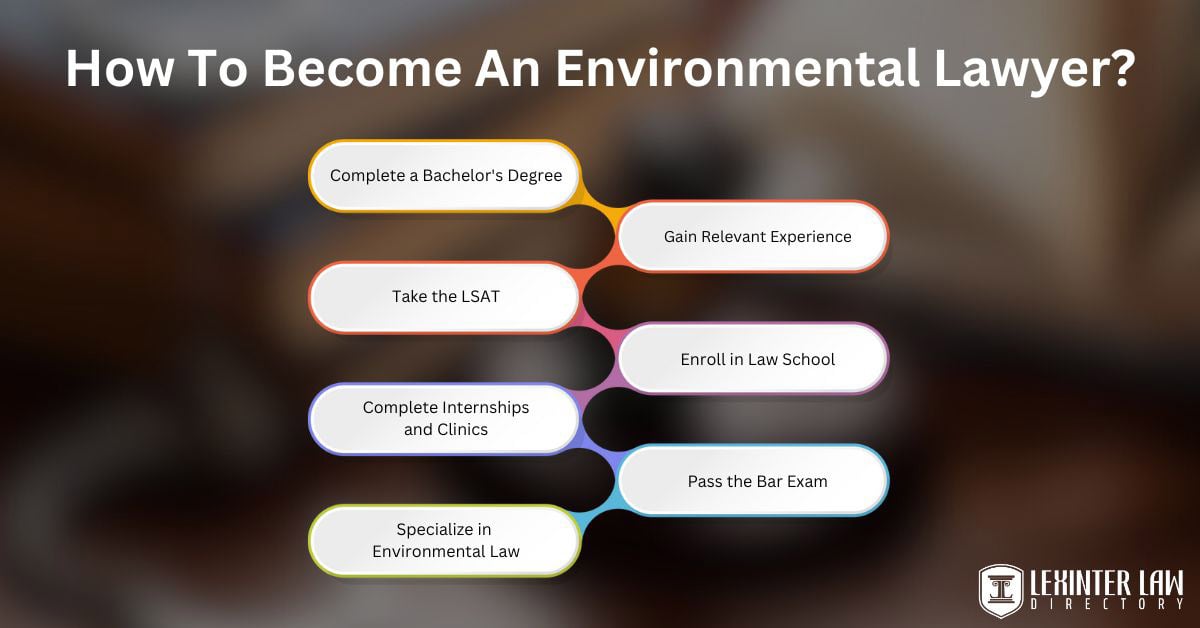
To become an environmental lawyer, follow the seven steps listed below.
- Complete a Bachelor’s Degree. Obtaining a Bachelor’s degree in environmental science, political science, or a related field provides a strong foundation for environmental law. Courses must include environmental policy, ecology, and government regulations to prepare for law school. Engaging in related extracurricular activities and research projects enhances knowledge and demonstrates commitment to environmental issues.
- Gain Relevant Experience. Participate in internships or volunteer with environmental organizations, government agencies, or legal firms that focus on environmental issues. The opportunities offer practical experience and help students build a professional network. Exposure to real-world environmental challenges and legal practices deepens the understanding of the legal field.
- Take the LSAT. Achieving a high score on the Law School Admission Test (LSAT) is crucial for admission to a reputable law school. The LSAT assesses reading comprehension, analytical reasoning, and logical reasoning skills, which are essential for success in law school. Preparing thoroughly for the test increases the chances of acceptance.
- Enroll in Law School. Enrolling in a law school is mandatory to become an environmental law attorney. Attending a law school with a strong environmental law program offers specialized courses and clinics. Participation in moot court, law review, and environmental law societies enhances legal education. Engaging with professors and peers in the programs provides valuable insights and networking opportunities in environmental law. Earning an environmental law degree from a reputable program solidifies my expertise.
- Complete Internships and Clinics. Law school clinics and internships with environmental law firms, nonprofit organizations, or government agencies provide hands-on experience. Working on real cases under supervision helps develop practical legal skills. The experiences offer a chance to make professional connections and gain a deeper understanding of environmental law in practice.
- Pass the Bar Exam. Law students must pass the Bar exam in the state where they intend to practice after graduating from law school. Preparation for the comprehensive test is essential for legal licensure. Success on the Bar exam demonstrates competence in legal knowledge and is a critical step toward becoming an environmental lawyer.
- Specialize in Environmental Law. Joining a law firm or organization specializing in environmental issues allows a focus on environmental regulations, compliance, and litigation. Continuous education on evolving environmental laws is necessary to remain current. Networking and joining professional organizations further enhance expertise and career prospects.
How Long Would It Take To Study Environmental Law?
It would take at least seven years to study environmental law. The path begins with obtaining a Bachelor’s degree, which usually takes four years. Students majoring in environmental science, political science, or a related field lay a solid foundation of knowledge essential for future legal studies. Aspiring environmental lawyers must attend law school, which generally requires three years of study, upon completing their undergraduate degree. Admission into law school mandates passing the Law School Admission Test (LSAT). Law school is demanding, with the first year focused on core courses such as contracts, torts, constitutional law, and legal writing. The courses are crucial for developing critical thinking and legal analysis skills.
Specialization in environmental law generally occurs in the second and third years of law school. Students take courses specific to environmental law, such as natural resources law, land use, water law, and international environmental law. Gaining practical experience through moot court, environmental internships, and law firm clerkships.
The next crucial step after graduating from law school is passing the Bar exam in the jurisdiction where one intends to practice. The exam is rigorous, requiring extensive preparation, and passing the Bar exam grants a license to practice law. Gaining expertise in environmental law involves additional training and experience. New lawyers begin their careers in law firms, government agencies, or non-profit organizations focusing on environmental issues. Continuous learning is crucial, as environmental law is a dynamic field influenced by evolving regulations, scientific developments, and international treaties. Becoming proficient in environmental law thus involves a minimum of seven years of dedicated study and training. The demanding yet rewarding journey prepares individuals to tackle complex environmental issues and contribute to protecting and preserving our natural world.
Is Environmental Law Difficult?
Yes, environmental law is difficult. Environmental law is a challenging field due to its complex and interdisciplinary nature. Navigating a web of local, national, and international regulations demands an understanding of legal principles, scientific data, and policy implications. Policymakers constantly update the laws, requiring practitioners to stay informed about the latest developments. The field encompasses various issues, including pollution control, natural resource management, biodiversity conservation, and climate change, with distinct legal frameworks and scientific considerations.
Environmental law involves balancing conflicting interests. Industries seek to minimize regulatory burdens, while environmental advocates push for stringent protections.
Achieving the balance requires nuanced negotiation skills and a deep understanding of legal and scientific arguments. Environmental law deals with long-term impacts and uncertain risks, complicating assessing potential harm and designing appropriate legal responses. Courts and regulatory agencies play crucial roles in interpreting and enforcing environmental laws, adding another layer of complexity. Practitioners must be adept at litigation and administrative procedures, navigating technical, scientific evidence, and expert testimony. International environmental law involves treaties and agreements between nations, requiring knowledge of international relations and comparative law. Environmental law demands the integration of diverse disciplines and perspectives, making the law a particularly hard area of legal practice.
What Can You Expect From A Career As An Environmental Lawyer?
You can expect substantial earnings potential, job growth, and the opportunity to contribute significantly to environmental protection and policy development from a career as an environmental lawyer. A career as an environmental lawyer offers substantial earnings potential and job growth. Environmental lawyers expect to earn an average annual salary of $136,260, with entry-level positions starting around $76,300. Lawyers at the higher end of the spectrum, especially in California and New York, earn up to $150,000 annually. The field involves advising clients on environmental regulations, representing them in legal matters, and advocating for policies that protect the environment. Common employers include government agencies, non-profit organizations, and private law firms. The role demands a thorough knowledge of environmental laws and requires long working hours, particularly during high-stakes cases.
Job growth for environmental lawyers is projected to increase by 5.6% over the next decade, reflecting the rising importance of environmental issues.
Facilities for environmental lawyers generally include well-equipped offices, access to extensive legal databases, and opportunities for fieldwork, depending on case requirements. The career offers a dependable workload and increasing demand due to the growing emphasis on sustainability and climate change legislation. Environmental lawyers receive additional compensation that includes bonuses, especially in the private sector. Health insurance, retirement plans, and paid leave form part of the standard benefits package. Opportunities for professional development and continuing education help lawyers stay updated on evolving laws and environmental issues. Environmental lawyers enjoy a rewarding career with competitive salaries.
What Is The Difference Between An Environmental Lawyer And A Health Care Lawyer?
The difference between an environmental lawyer and a health care lawyer involves the focus areas and responsibilities unique to each field. An environmental lawyer specializes in regulations and laws that protect natural resources, manage pollution, and address climate change issues. A health care lawyer deals with legal matters related to the healthcare system, including compliance with health care laws, patient rights, and medical malpractice. Environmental lawyers work on cases involving land use, conservation efforts, and the enforcement of environmental regulations. Health care lawyers navigate the complexities of healthcare policies, ensure health care providers comply with regulations, and represent clients in disputes related to healthcare services. Each type of lawyer requires knowledge of their respective regulatory frameworks. Environmental lawyers must understand the Clean Air Act, and health care lawyers must be familiar with the Health Insurance Portability and Accountability Act (HIPAA).
The similarities between an environmental Lawyer and a health care lawyer revolve around their shared commitment to public well-being and regulatory compliance. Environmental lawyers address pollution control, conservation, and adherence to environmental laws. Health care lawyers handle patient rights, medical malpractice, and compliance with healthcare regulations. Healthcare and environmental lawyers require a deep understanding of complex legal frameworks and the ability to navigate intricate regulatory systems. Advocacy for client interests, whether protecting natural resources or ensuring patient safety, remains a core function for the lawyers. Environmental and health care lawyers engage in litigation and policy-making. The lawyers provide expert legal advice to ensure their respective fields operate within the legal boundaries set by federal, state, and local authorities.
How Do Environmental Lawyers Earn?
Environmental lawyers earn through private law firms, government agencies, consulting, teaching at universities, and writing/publishing on environmental law. The avenues offer varied income opportunities based on expertise and role within regulatory compliance, litigation, and advisory services. Private law firms represent a major source of income for environmental lawyers. The firms hire lawyers to handle cases involving regulatory compliance, litigation, and advisory services for businesses. The earnings in private law firms are substantial, especially in California and New York, where salaries range from $115,000 to $200,000 annually for experienced lawyers. Government agencies employ environmental lawyers to develop and enforce environmental laws, draft regulations, and represent the government in legal proceedings. The roles generally offer lower salaries compared to private firms, generally ranging from $60,000 to $120,000 per year, depending on the level of government and the lawyer’s experience.
Consulting is another way environmental lawyers earn money. The lawyers provide expert advice on environmental regulations, assist companies in achieving compliance, and help develop sustainable practices. Consulting fees vary widely but provide a lucrative income stream for experienced lawyers with specialized knowledge. Teaching positions at universities and law schools offer a source of income for environmental lawyers. The roles involve educating the next generation of lawyers and conducting research in environmental law. Academic salaries range from $50,000 to $150,000, depending on the institution and the lawyer’s academic credentials and experience. Writing and publishing on environmental law issues provide additional income opportunities. Lawyers author books, articles, and papers, contributing to academic and professional discourse while earning royalties and fees. Each of the avenues offers unique opportunities and compensation levels, reflecting the diverse roles that environmental lawyers play in various sectors of society.
Where Do Environmental Lawyers Work?
Environmental lawyers work in government agencies, non-profit organizations, private law firms, and corporations. The Environmental Protection Agency (EPA) employs environmental lawyers to develop, implement, and enforce regulations. Non-profit organizations like the Natural Resources Defense Council (NRDC) and the Sierra Club hire them to advocate for policy changes, litigate issues, and protect resources.
Corporations in the energy, manufacturing, and agriculture industries need environmental lawyers to ensure compliance with environmental laws and regulations. The lawyers help companies navigate complex legal requirements and avoid potential liabilities.
Private law firms specializing in environmental law provide legal services to clients that include individuals, businesses, and government entities. The firms handle cases related to pollution, land use, conservation, and climate change. Academic institutions employ environmental lawyers as professors and researchers, contributing to the development of environmental law and policy. Environmental lawyers work internationally with organizations, including the United Nations and the World Bank, addressing global environmental issues and promoting sustainable development. Diverse employment opportunities for lawyers reflect the broad impact of environmental law on society and the need for expertise in the vital field.
Are Environmental Lawyers Highly Paid?
Yes, environmental lawyers are highly paid. Environmental lawyers command high salaries due to their specialized knowledge and expertise. The professionals play a crucial role in navigating complex environmental regulations and advocating for sustainable practices. Environmental lawyers expect to earn an average annual salary of $136,260, with entry-level positions starting at approximately $76,300. Top earners, particularly lawyers in private sectors or large firms, make well over $200,000 per year. Geographic location significantly impacts salaries; states like California and New York, known for stringent environmental laws, offer higher compensation. Environmental lawyers in the areas work on high-stakes cases involving large corporations or government agencies, which contributes to their substantial earnings. The demand for environmental legal expertise continues to grow, driven by increasing regulatory requirements and societal focus on environmental issues. The financial rewards for the professionals reflect their essential contribution to addressing critical environmental challenges.
How To Find Good Environmental Lawyers Near Me With Lexinter?
To find a good environmental lawyer near me with Lexinter, begin by accessing the Lexinter law directory online. The comprehensive directory allows individuals to search for environmental lawyers by city, state, or region. Lexinter provides a broad array of filtering options to narrow down the search to specific legal categories, including environmental law.
Environmental lawyers specialize in environmental regulations, land use, pollution control, and natural resource management. The lawyers handle cases involving environmental compliance, litigation, and advocacy for sustainable practices. Clients searching for an environmental lawyer on Lexinter must use specific keywords such as “environmental law,” “pollution control,” or “land use.”
Lexinter provides detailed profiles for each listed environmental lawyer or law firm. The profiles generally include the firm’s name, address, phone number, credentials, and hours of operation. Lexinter features links to the firm’s Google My Business profile, social media profiles, and website. The linking allows potential clients to gather comprehensive information about the environmental lawyer’s background and areas of expertise. Clients schedule consultations directly through the environmental lawyer’s Lexinter profile. Clients seeking assistance with environmental issues turn to Lexinter for help with regulatory compliance, impact assessments, and litigation. The process ensures that individuals needing environmental legal services find and contact environmental lawyers easily. Utilizing the Lexinter is a strategic and efficient approach to finding a reputable environmental lawyer.
Which Country Has The Best Environmental Law?
Germany has the best environmental law. Germany stands out for having one of the most comprehensive and effective environmental laws globally. The country’s robust legal framework aims to address climate change, waste management, and sustainable development. Germany’s Federal Climate Change Act sets legally binding emission reduction targets. The laws aim to achieve climate neutrality by 2045, ensuring the country stays on track with its ambitious climate goals. The Circular Economy Act mandates strict waste management protocols, emphasizing recycling and responsible disposal. Producers must ensure waste is treated in authorized facilities, and they retain liability even after transferring waste to third parties. The Packaging Act further compels manufacturers to take back and recycle packaging materials.
Germany’s environmental regulations encompass innovative measures, including the Single-Use Plastics levy. The policy imposes a charge on businesses for distributing single-use plastic products. The policy encourages the reduction of plastic waste and promotes environmental sustainability. The country integrates European Union directives into national law, enhancing its legal framework’s robustness. National authorities, including the Federal Environment Agency, enforce laws and ensure sector compliance and accountability. Germany’s comprehensive approach, combining stringent regulations with progressive initiatives, positions the country as an environmental law leader.

